2024-10-04
-
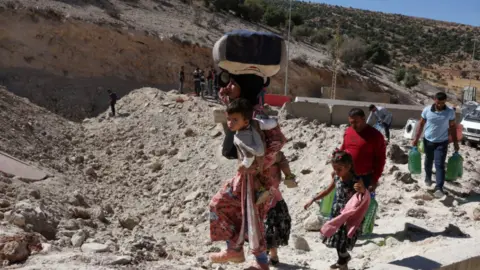Reuters People are now fleeing on foot into Syria after an Israeli strike created a huge crater in the road An Israeli air strike has hit near the main border crossing point for people fleeing the escalating bombing and ground campaign in Lebanon for neighbouring Syria. Israel's military said it had hit Hezbollah targets near the Masnaa crossing, and earlier claimed the group was using it to smuggle weapons into Lebanon. The strike on Friday destroyed a section of the road and effectively cut off vehicle access. People are still able to make the journey on foot, with pictures showing families clambering over rubble and scrambling through the four-metre crater in the road to get out of the country. More than 300,000 people have left Lebanon for Syria in the past 10 days to flee the bombing, according to Lebanese government figures. The strike on Friday hit the road 700m from the checkpoint on the Lebanese side, and around 5km (3.1 miles) from the border itself. Aid workers said the destruction of the road near Masnaa crossing hinders both the movement of people and also food and humanitarian supplies. * [BBC Verify: A closer look at the crater damage near Syria’s border crossing](https://www.bbc.co.uk/news/live/c39l7lv9pevt?post=asset%3A2c290de3-3f42-4599-9a71-baec5bfd467a#post) "It will mean that goods which would normally come overland through that crossing - the cheapest, most effective way to bring commodities into that country - will also not be able to be received here," Matthew Hollingworth, the director of the UN's World Food programme, told the BBC. 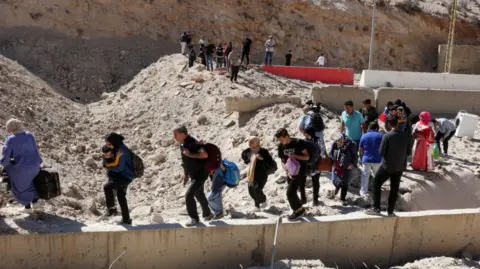Reuters Despite the strike people were still on the move on Friday to flee Lebanon Video shows huge crater left by strike on key route out of Lebanon 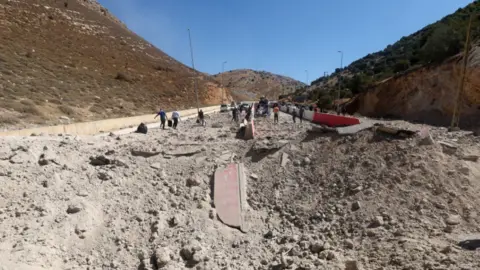Reuters The strike created a four-metre crater in the middle of the road, cutting off vehicle access Mr Hollingworth stressed that it was essential for other routes leading out of Lebanon - particularly those in the north - to remain unhindered. "We really would press that they remain open because they will be critical for people to leave, and also for humanitarian commodities to come in," he told BBC Radio 4's Today programme. The Masnaa crossing in Lebanon's east had been the main path for people to move into Syria, and then onto Jordan and the Gulf States, while in Lebanon the road had also connected west to the capital Beirut on the coast, which has been heavily bombed in recent days. The Israel Defense Forces (IDF) on Friday said it had targeted a site at the border crossing where "weapons were transferred to Hezbollah", and also a 3.5km underground tunnel between Lebanon and Syria, the location of which was not specified. In a statement issued before the strike, the IDF said the crossing had become the "primary border crossing for Hezbollah's weapons transfers" and accused the group of concealing "smuggling activity among civilian trucks and vehicles". It called on Lebanon to thoroughly inspect trucks. Many people moving east are Syrian nationals living in Lebanon, who have headed back to their own country to escape Israel's bombardments. [The BBC spoke to one woman in Beirut](https://www.bbc.co.uk/news/live/c39l7lv9pevt?post=asset%3Afa695828-f196-454e-a5ec-a1d358e9bcbb#post), who had sent her son back to Syria this week because the capital was too dangerous. "I found a lot of people from our neighbourhood heading for Syria, so I sent him with them," she said. Syria's government said on Sunday that for the next week people crossing the border would no longer have to pay $100 to enter the country. 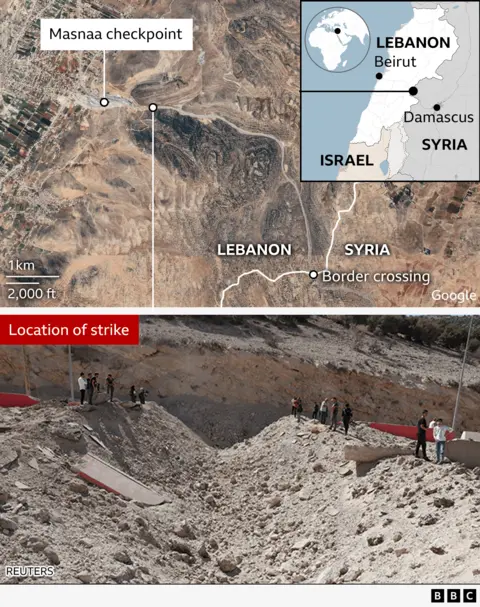 On Friday, [strikes also hit near Lebanon's only commercial airport](https://www.bbc.co.uk/news/articles/c17lpydd842o), the Beirut-Rafic Hariri International Airport. The airport borders the suburb of Dahieh, Hezbollah's stronghold in the city, and a continued target of Israeli air strikes. Major strikes there one week ago killed the long-time leader of Hezbollah, Hassan Nasrallah. Reports indicated that the new strikes on Friday morning were aimed at the group's new leadership, including a potential new overall leader, Hashem Safieddine. Lebanon's public health ministry said 37 people had been killed in ground and air attacks on Thursday while 151 others had been wounded. More than 2,000 people have been killed in Lebanon by Israeli air strikes since fighting began in October 2023, the Lebanese health ministry says. Israeli forces on Friday also told residents of another two dozen towns and villages in the South, including the regional capital city of Nabatieh, to leave immediately for their safety. The new order applies to communities further inland, north of the Litani river, about 30km from the border with Israel. The river is a crucial marker as Israel has previously demanded that Hezbollah withdraw to the Litani, as per the UN Security Council resolution that ended their last war in 2006. But there are concerns in Lebanon that Israel will seek to occupy part of the country's south again.
2024-11-11
-
When the civil war in Syria threatened his village more than a decade ago, a farmer and his family fled to neighboring Lebanon. The farmer, Ali Kheir Khallu, 37, found work there growing oranges and bananas. Life was hard, he said, but at least he felt safe. That feeling vanished last month as [Israel ramped up its war with Hezbollah](https://www.nytimes.com/2024/10/04/world/middleeast/israel-hezbollah-lebanon.html), the powerful Lebanese militia, heavily bombing sites that it said belonged to the group. When the bombs fell near Mr. Kheir Khallu’s house, he packed up his family, left behind the new lives they had built in Lebanon and fled back to Syria, where they are now struggling to start over, yet again. “You want to make up for all that you have lost,” he said. “But you are still in shock.” As the war in Lebanon expands, more than 1.2 million people — one-fifth of the population — have [been displaced from their homes](https://www.nytimes.com/2024/10/16/world/middleeast/israel-lebanon-displaced-hezbollah.html), the government says. While most have sought safety in other parts of Lebanon, more than 470,000 people, mostly Syrians, have crossed into Syria in the last six weeks, aid groups say. Since Syrian rebels tried to topple the government in 2011, President Bashar al-Assad has fought to stay in power, with his forces bombing and besieging opposition communities and repeatedly using chemical weapons. The war drew in Russia, the United States, the jihadists of Islamic State and other forces, displacing about 12 million residents, or more than half the country’s population. Thank you for your patience while we verify access. If you are in Reader mode please exit and [log into](https://myaccount.nytimes.com/auth/login?response_type=cookie&client_id=vi&redirect_uri=https%3A%2F%2Fwww.nytimes.com%2F2024%2F11%2F11%2Fworld%2Fmiddleeast%2Flebanon-war-syrians-returning-home.html&asset=opttrunc) your Times account, or [subscribe](https://www.nytimes.com/subscription?campaignId=89WYR&redirect_uri=https%3A%2F%2Fwww.nytimes.com%2F2024%2F11%2F11%2Fworld%2Fmiddleeast%2Flebanon-war-syrians-returning-home.html) for all of The Times. Thank you for your patience while we verify access. Already a subscriber? [Log in](https://myaccount.nytimes.com/auth/login?response_type=cookie&client_id=vi&redirect_uri=https%3A%2F%2Fwww.nytimes.com%2F2024%2F11%2F11%2Fworld%2Fmiddleeast%2Flebanon-war-syrians-returning-home.html&asset=opttrunc). Want all of The Times? [Subscribe](https://www.nytimes.com/subscription?campaignId=89WYR&redirect_uri=https%3A%2F%2Fwww.nytimes.com%2F2024%2F11%2F11%2Fworld%2Fmiddleeast%2Flebanon-war-syrians-returning-home.html).
2024-12-01
-
Rebel forces advanced in Syria on Sunday amid fierce fighting, capturing the airport of the major city of Aleppo and attacking the outskirts of the western city of Hama, according to local officials and the Syrian Observatory for Human Rights. Government troops loyal to President Bashar al-Assad were trying to repel them, they said. [The rebels had captured much of Aleppo](https://www.nytimes.com/2024/11/30/world/middleeast/syria-aleppo-rebels-control.html) a day earlier in a surprise offensive. They now [control a broad swath of land](https://www.nytimes.com/article/syria-civil-war.html) across the provinces of Hama, Idlib and Aleppo, in the west and northwest of Syria, according to information from local officials and the Observatory, a Britain-based war monitor. The New York Times also observed rebels in control of parts of Hama Province as well as neighborhoods in the east of the city of Aleppo and some of the countryside beyond it that were only days earlier held by government forces. Government troops were battling to defend the city of Hama from being overrun, the Observatory said. Syrian government warplanes were also bombing territory that was now rebel-held, causing civilian casualties, the monitor said. It said that government forces were receiving support from Russian fighter jets, which were striking targets across the countryside near Hama and Idlib province. Russia, which is allied with Mr. Assad, has repeatedly come to his aid since early in the civil war that broke out in 2011, after protests over Mr. Assad’s autocratic rule drew a swift and bloody military crackdown. A government statement said Mr. Assad had spoken to the leaders of the United Arab Emirates and Iraq on Saturday, vowing that Syria would “defeat the terrorists, regardless of the intensity of their attacks.” Syrian officials routinely refer to rebels as terrorists. The Syrian military also said in a statement on Saturday that its operation to push back the rebels was “successfully” progressing and that it would soon initiate a counterattack. It tried to discredit reports about rebel advances, saying that the armed groups were spreading “false news” to “undermine the morale of our people and our brave army.” Across the territory that had flipped back to the rebels, people could be seen tearing up Syrian government flags and pictures of Mr. Assad, including fighters and former Aleppo residents who were returning to their homes for the first time in years. Photos taken in Aleppo also showed the toppling of a statue that had apparently depicted Bassel al-Assad, the president’s elder brother. Hwaida Saad contributed reporting from Beirut, Lebanon, and Rania Khaled from Cairo.
2024-12-02
-
Last week [I argued](https://www.nytimes.com/2024/11/26/opinion/trump-israel-iran.html) that the blows Israel inflicted on Iran and its most important proxy, Hezbollah, would have vast consequences for the military balance in the region. It has only taken a few days for those consequences to start showing up. Donald Trump reportedly wants the region’s conflicts quieted down by the time he comes to office. Hey — good luck with that. For starters, with Iran and Hezbollah weakened by Israel, the leader they were protecting most, the beleaguered Syrian president, Bashar al-Assad, took a body blow in the last few days when anti-government rebels in Syria swept in from their countryside redoubts and swept out Assad’s army from virtually all of Aleppo, the second largest city in Syria. Alas, though, many of these Syrian rebels are not boy scouts — the group leading the charge, Hayat Tahrir al-Sham, is a former Al Qaeda affiliate — and if Assad were toppled from power in Damascus, Syria, it could draw Israel in and destabilize the whole Levant. Interestingly, Turkey, which backs some of these rebel groups and had been restraining them, may have given the green light for the attack. Turkey has long been Iran’s archrival for regional domination. At the same time, a Western intelligence source tells me, a rancorous debate is afoot within Iran’s leadership over who is responsible for letting Hezbollah drag both Iran and Hezbollah into a devastating war with Israel — on behalf of Hamas — when Israel had not even attacked Hezbollah. As a result, Hezbollah’s rocket forces, meant to deter Israel from ever bombing Iran’s nuclear facilities, have now been shattered. Inside Lebanon, Hezbollah, which had become the army of the Shiites of Lebanon and imposed itself as the sacred third part of the country’s trinity — “the army, the people and the resistance” — to which every Lebanese leader had to pay homage, has dramatically lost support. Israel was so surgical in its bombing inside Lebanon, trying to hit only Hezbollah targets and pro-Hezbollah neighborhoods, that it sent the message: “If you live in places that are loyal to the Lebanese state, you are safe, but if you stay in places Hezbollah controls, you are not safe,” explained Hanin Ghaddar, an expert on Hezbollah at The Washington Institute. Thank you for your patience while we verify access. If you are in Reader mode please exit and [log into](https://myaccount.nytimes.com/auth/login?response_type=cookie&client_id=vi&redirect_uri=https%3A%2F%2Fwww.nytimes.com%2F2024%2F12%2F02%2Fopinion%2Ftrump-mideast-syria-conflicts.html&asset=opttrunc) your Times account, or [subscribe](https://www.nytimes.com/subscription?campaignId=89WYR&redirect_uri=https%3A%2F%2Fwww.nytimes.com%2F2024%2F12%2F02%2Fopinion%2Ftrump-mideast-syria-conflicts.html) for all of The Times. Thank you for your patience while we verify access. Already a subscriber? [Log in](https://myaccount.nytimes.com/auth/login?response_type=cookie&client_id=vi&redirect_uri=https%3A%2F%2Fwww.nytimes.com%2F2024%2F12%2F02%2Fopinion%2Ftrump-mideast-syria-conflicts.html&asset=opttrunc). Want all of The Times? [Subscribe](https://www.nytimes.com/subscription?campaignId=89WYR&redirect_uri=https%3A%2F%2Fwww.nytimes.com%2F2024%2F12%2F02%2Fopinion%2Ftrump-mideast-syria-conflicts.html).
2024-12-06
-
Islamist insurgents have captured the Syrian city of Hama in a battle to seize a vital location on the road to Damascus, marking the [latest challenge to Bashar al-Assad’s control of the country.](https://www.theguardian.com/world/2024/dec/05/syrian-rebels-surround-strategic-city-of-hama-after-aleppo-takeover) Militants led by the group Hayat Tahrir al-Sham (HTS) entered the city from the east on Thursday after surrounding it during five days of fighting with forces loyal to Assad. Video circulating online suggested that the insurgents had captured a military airport outside Hama, and released prisoners held in a fearsome state detention facility. As night fell, militant representatives said they had “fully established control over the city of Hama,” and called on police and militias in the city to defect. “This victory will be without revenge and merciful,” said the leader of HTS, Abu Mohammed al-Jolani, in a message to the people of Hama. The Syrian defence ministry initially denied that insurgents had enteredHama, calling its defensive lines “impregnable”. But as fighting intensified and drew closer to the city centre, the Syrian army said it had withdrawn, redeploying its forces “to preserve the lives of civilians and not to involve the people of Hama city in these battles”. Positioned on a highway that runs down the western side of Syria towards the capital, Damascus, Hama was the site of mass uprisings against Assad in 2011, and then fierce battles when opposition forces attempted and failed to take control of the city in the ensuing civil war. Hama is also the [site of a notorious 1982 massacre](https://www.theguardian.com/theguardian/from-the-archive-blog/2011/aug/01/hama-syria-massacre-1982-archive), when forces loyal to former president Hafez al-Assad besieged the town to prevent an uprising led by Sunni Muslim opponents of his rule. The sweeping offensive led by HTS has resulted in Assad losing control of Syria’s second largest city, Aleppo, and swaths of the northwest of the country. The UN’s World Food Programme said the escalation has displaced more than 280,000 people, “adding to years of suffering.” The surge in violence has led to fears of an aid crisis, with UN secretary general Antonio Guterres speaking of an urgent need for civilian access to immediate humanitarian support, and a parish priest in Aleppo, Father Bahjat Karakach, voicing concerns that the fear of the bombing is giving way to the [“danger of hunger”](https://www.asianews.it/news-en/Famine-looms-in-wake-of-bombing%2C-warns-Aleppo%27s-parish-priest-62050.html) amid soaring food prices. Guterres urged a UN-facilitated political process to end the bloodshed, asking “all those with influence to do their part for the long-suffering people” of Syria and noting all parties had an obligation to protect civilians. On Friday, Iraqi foreign minister Fuad Hussein will meet his Syrian and Iranian counterparts in Baghdad to discuss the situation in Syria, the Iraqi state news agency reported.The move comes days after [emergency talks were held in Ankara.](https://www.theguardian.com/world/2024/dec/02/syria-crisis-summit-turkey-iran-russia) Some Iraqi fighters entered Syria early this week to support Assad, Iraqi and Syrian sources told Reuters. Iraq’s Iran-aligned Hashd al-Shaabi paramilitary coalition has mobilised along the border with Syria, saying this was purely preventive in case of spillover into Iraq. Tens of thousands of members of Assad’s Alawite minority community were fleeing Syria’s third city Homs on Thursday, for fear that Islamist-led rebels would keep up their advance, a war monitor said. Homs lies just 40km (25 miles) south of Hama. Britain-based war monitor the Syrian Observatory for Human Rights reported “the mass exodus of Alawites from Homs neighbourhoods, with tens of thousands heading towards the Syrian coast, fearing the rebel advance”. Khaled, who lives on the city’s outskirts told Agence France-Presse that “the road leading to \[coastal\] Tartus province was glowing ... due to the lights of hundreds of cars on their way out”. Turkish president Recep Tayyip Erdoğan told Guterres in a phone call that the conflict in Syria had reached “a new phase.” “The Syrian regime, at this stage, must urgently engage with its own people for a comprehensive political solution,” he said. The sudden losses appear to have unsettled Assad’s longtime backers in Moscow and Tehran, with [Russian forces consumed with their invasion of Ukraine](https://www.theguardian.com/world/2024/dec/04/moscow-claims-external-forces-seeking-to-escalate-violence-in-syria) and Iran concerned about its forces being targeted by Israeli airstrikes on Syrian territory, which have increased in the last year. Naim Qassem, head of Iranian proxy Hezbollah in Lebanon that has fought in support of Assad, pledged to “stand by Syria to thwart the aggression against it.” The Kremlin spokesperson, Dmitry Peskov, told reporters that Moscow was “closely monitoring”, events in Syria. “Depending on the assessment of the situation, we will be able to talk about the degree of assistance that is needed by the Syrian authorities to cope with the militants and eliminate this threat,” he said. Gregory Waters, an analyst of the Syrian army with the Middle East Institute, said a combination of low morale, low pay, corruption and dysfunction within the chain of command had contributed to the sudden rout of government forces from areas they had controlled for years. The Syrian army, he said, was “completely unprepared”, for the insurgent offensive. Amid reports of rising desertions from the Syrian army or fighters fleeing their positions, Assad issued a decree raising salaries for military personnel by 50% earlier this week. The Syrian president appeared to be seeking to muster a counter-offensive as the fighting drew closer to the capital. Military support from Iran and Russia has been limited when compared with previous iterations of the conflict in Syria, said Waters. “I think it’s hard to see a scenario where forces loyal to the regime in Damascus can regain momentum,” he said. “Even if the Russians and Iranian or Iranian-backed forces get more involved, they’re still limited by their own wars. It feels unlikely to reach the level of support we’ve seen previously.”
2024-12-09
-
 The swift downfall of Bashar al-Assad is reverberating in Syria and throughout the Middle East. Some changes are already apparent. Syrians who fled the country's vicious civil war years ago are lining up at border crossings to return home. The gates are swinging open at the country's notorious prisons, freeing thousands. Syrians are speaking freely after decades of repressive rule. Many more developments are still to come. Here's a preliminary look at what the upheaval could mean for a range of countries that have interests in Syria. ### United States The U.S. military carried out an unusually large airstrike Sunday on Islamic State bases in central Syria. The U.S. says this was done because a group of Islamic State fighters gathered to train, perhaps hoping to take advantage of the turmoil in Syria. The U.S. hit some 75 targets with a variety of aircraft, including massive B-52 bombers. U.S. forces have been battling the Islamic State in Syria for a decade and largedly defeated the group five years ago. About 900 U.S. troops remain to prevent a resurgence of the extremist organization. Most of the Americans are in remote northeastern Syria, with others in the far south. President Biden said Sunday the U.S. would maintain this military presence. He called Assad's ouster both a moment of risk and opportunity, adding that the U.S. would work with Syrians as they try to put together a new government. However, President-elect Trump is striking a different tone. He took to social media over the weekend and said Syria is not a U.S. problem, the U.S. should not get involved, and should just let events play out. But the U.S. is already involved. Those U.S. troops are not just fighting the Islamic State, they've also been protecting vulnerable Syrian civilians. Mouaz Moustafa, with the [Syrian Emergency Task Force](https://setf.ngo/), an American aid group, said the U.S. forces have supplied humanitarian assistance to displaced civilians in a barren area on Syria's southern border. "If you spoke to any of these people and you asked them about the United States military, and you asked them about the relationship between the two, those Syrians love the American military," Moustafa said.  Assad's downfall is the latest in a series of major setbacks for Tehran. Persian Iran has spent the past four decades developing Arab partners and proxies in the region, collectively known as the "axis of resistance." But in the past year, they've been tumbling like dominos. Iran was critical to Assad as he battled to stay in power during the country's civil war that erupted in 2011. Iran's Revolutionary Guards maintained a strong presence in Syria until pulling out last week, just ahead of rebel advances. Iran also used Syria as a bridge to ship weapons to Hezbollah in Lebanon. But now Assad is gone, Hezbollah has been greatly weakened by its war with Israel, and another Iranian proxy, Hamas in Gaza, has been devastated by its own war with Israel. "Losing Syria will deal a huge blow to Iran and its proxies in the region. And that's why I think right now the leaders in Tehran must be feeling quite anxious," said [Gonul Tol](https://www.mei.edu/profile/gonul-tol), with the Middle East Institute in Washington. "This is a moment where Iran's regional strategy has been dealt a huge blow, and at a time when the regime at home is being questioned by millions of Iranians."  Syria was Russia's main partner in the region for decades. When the Syrian rebels were threatening Assad's government in 2015, the Russian air force heavily bombed rebel areas and helped secure Assad's hold on power. Russia's President Vladimir Putin said this showed Russia's commitment to supporting its allies. But Russia is now preoccupied with the war in Ukraine and carried out only a few airstrikes as Assad's regime collapsed, demonstrating it was not able or willing to provide significant support. Russia places great value on the naval base and the air base it has on Syria's Mediterranean coast. They are Russia's only military bases in the Middle East, and now they are very much at risk. Russia's previous bombing campaigns inflicted heavy punishment on the rebels — and Syrian civilians — and they may not be inclined to let Russia keep that military presence. In addition, Russia has granted asylum to Assad and his family, which could be a point of contention with a new Syrian government. ### Israel Israel was always at odds with Assad, but considered him the devil they knew. Israel acknowledged that Assad kept the frontier with Israel largely calm, even when the wider region was aflame. Israel will now face a Syria that's highly unpredictable and where Islamist groups could assume a prominent role. For the past year, Israel has been fighting one such group to its south — Hamas in Gaza — and another to its north — Hezbollah in Lebanon. Israel is wary of a similar group in Syria. Israel captured the Golan Heights from Syria in the 1967 Mideast war and later annexed the strategic territory. Israel's continued hold on the Golan Heights is certain to remain a major point of friction, regardless of who emerges in power in Damascus. ### Turkey Turkey's President Recep Tayyip Erdogan has multiple aims in Syria and is well positioned to play a leading role in its future. For starters, he would like to shape a new government in Syria to his liking, said the Middle East Institute's Gonul Tol, author of [_Erdogan's War: A Strongman's Struggle at Home and in Syria._](https://academic.oup.com/book/46145) "Turkey can become the kingmaker," said Tol. "Turkey will stand to benefit both domestically and regionally from a new and, potentially, a very friendly government in Damascus." The Turkish leader would also like to see more than 3 million Syrian refugees in Turkey head home. Some have already begun doing so. In addition, Turkish construction companies are well placed to rebuild Syria, ravaged by more than a decade of war. However, Erdogan's ambitions will depend on Syria restoring relative stability. Under Erdogan, the Turkish military has often operated in Syria against various Kurdish groups that Erdogan views as a potential threats to his rule. If Erdogan chooses to operate against Kurdish factions in Syria, that could undermine efforts to rebuild Syria.
2024-12-15
-
The skies were quiet the other night in the northwestern town of Tel Rifaat, Syria, and relief was palpable among fighters and civilians who have lived for years under the constant threat of bombardment. A man named Ali, 48, guarded the northern entrance to town, sitting in a chair on the road next to a wood stove at an old police post. He gave only his first name for security reasons. But there was no danger of attack, he said, and no bombing. As night fell in the courtyard of a primary school, Syrian rebel fighters from the town — who helped recapture it from government-allied forces less than two weeks ago — knelt for the evening Muslim prayer. They were still elated by their victory, which ended their own lives of displacement, spent in tents, and those of many families from the town, who were already coming home. “The people of Tel Rifaat really wanted to return to their town,” said Firas Alito al-Ageid, 40, commander of the rebel unit. “This was the most important thing. They had the desire to return.” Image A man named Ali, with a cat, guarding a checkpoint on the main road leading into town. Rebel fighters at Friday Prayer in Tel Rifaat after retaking the town. “It is from God that we are back in our land,” one fighter said. The map highlights the city of Tel Rifaat, north of Aleppo, in northwestern Syria. It also locates the capital, Damascus, in the southwest.  By The New York Times Thank you for your patience while we verify access. If you are in Reader mode please exit and [log into](https://myaccount.nytimes.com/auth/login?response_type=cookie&client_id=vi&redirect_uri=https%3A%2F%2Fwww.nytimes.com%2F2024%2F12%2F15%2Fworld%2Fmiddleeast%2Fsyria-rebel-stronghold-return.html&asset=opttrunc) your Times account, or [subscribe](https://www.nytimes.com/subscription?campaignId=89WYR&redirect_uri=https%3A%2F%2Fwww.nytimes.com%2F2024%2F12%2F15%2Fworld%2Fmiddleeast%2Fsyria-rebel-stronghold-return.html) for all of The Times. Thank you for your patience while we verify access. Already a subscriber? [Log in](https://myaccount.nytimes.com/auth/login?response_type=cookie&client_id=vi&redirect_uri=https%3A%2F%2Fwww.nytimes.com%2F2024%2F12%2F15%2Fworld%2Fmiddleeast%2Fsyria-rebel-stronghold-return.html&asset=opttrunc). Want all of The Times? [Subscribe](https://www.nytimes.com/subscription?campaignId=89WYR&redirect_uri=https%3A%2F%2Fwww.nytimes.com%2F2024%2F12%2F15%2Fworld%2Fmiddleeast%2Fsyria-rebel-stronghold-return.html).
-
Israel struck dozens of sites in [Syria](https://www.theguardian.com/world/syria) overnight with airstrikes, despite the Syrian rebel leader, Abu Mohammed al-Jolani, saying his Hayat Tahrir al-Sham (HTS) group was not interested in conflict with Israel. The latest airstrikes follow a statement by Israel’s defence minister, Israel Katz, that Israeli troops, who seized the Golan Heights buffer zone with Syria last week, would remain for the winter on Mount Hermon [in positions they occupied last week.](https://www.theguardian.com/world/2024/dec/11/golan-heights-israeli-troops-syria-assad) Katz’s office said in a statement that “due to what is happening in Syria, there is enormous security importance to our holding on to the peak”. Abu Mohammed al-Jolani, a nom de guerre used by Ahmed al-Sharaa, told Syrian state media: “There are no excuses for any foreign intervention in Syria now after the Iranians have left. We are not in the process of engaging in a conflict with Israel.” Jolani said Israel was using false pretexts to justify its attacks on Syria, but that he was not interested in engaging in new conflicts as the country focused on rebuilding following the end of Bashar al-Assad’s reign. He added that “diplomatic solutions” were the only way to ensure stability stability and rather than “ill-considered military adventures”. [Syria map](https://interactive.guim.co.uk/uploader/embed/2024/12/golanheights-zip/giv-45596Qb4KZHwvC0w) “Israeli arguments have become weak and no longer justify their recent violations. The Israelis have clearly crossed the lines of engagement in Syria, which poses a threat of unwarranted escalation in the region,” Jolani said. “Syria’s war-weary condition, after years of conflict and war, does not allow for new confrontations. The priority at this stage is reconstruction and stability, not being drawn into disputes that could lead to further destruction.” The British-based Syrian Observatory for Human Rights said Israel fired 61 missiles at Syrian military sites in less than five hours on Saturday evening. Israeli air raids hit bases, heavy weapons, sites associated with the former Assad regime’s missile and chemical weapons programme, and destroyed Syria’s small naval force in port of Latakia. [](https://www.theguardian.com/world/2024/dec/15/israel-launches-dozens-of-airstrikes-on-syria-despite-rebel-leader-peace-pledge#img-2) Syrian naval vessels destroyed by an Israeli airstrike last week in the port of Latakia. Photograph: Omar Albam/AP The continuing strikes have prompted mounting concern among diplomats and international officials concerned over what they fear may be an open-ended new occupation of Syrian territory. The UN has called on Israel to withdraw from the buffer zone, which sits between Syria and the Israeli-occupied Golan Heights. The UN secretary-general, António Guterres, said he was “deeply concerned by the recent and extensive violations of Syria’s sovereignty and territorial integrity”. France, Germany and Spain have also called on Israel to withdraw from the demilitarized zone. The UN has said Israel is in violation of a 1974 disengagement agreement between Israel and Syria that established the buffer zone. Israel has said the 1974 disengagement agreement “collapsed” with the fall of the Assad regime government. Responding to Jolani, the Israel Defence Forces chief of staff, Herzi Halevi, said, “We aren’t intervening in what is happening in Syria. We have no intention of administering Syria.” “There was an enemy country here. Its army collapsed. There is a threat that terror elements will come here, and we advanced so … extreme terror elements won’t settle close to the border with us. “We are unequivocally intervening only in what determines Israeli citizens’ security. The deployment along the entire border, from Mt Hermon to the meeting of the Israeli-Syrian-Jordanian border, is proper.” According to reports, among the sites hit over the over the weekend were military headquarters, Syrian army positions, radars, and arms caches and assets of the Syrian Scientific Studies and Research Center, which was responsible for developing advanced weapons. Israel also estimates it has destroyed much of the Syrian air force’s infrastructure and aircraft. The scale of the Israeli bombing campaign has surprised many western capitals who had believed that any Israeli strikes would be limited to chemical weapons and missiles sites rather than an effort aimed at the wholesale destruction of the Syria’s military, which has had 70% of its capabilities destroyed in hundreds of attacks. The latest Israeli air raids came as the US secretary of state, Antony Blinken, wound up talks with Jordan, Turkey and Iraq with the aim of trying to shape the future of post-Assad Syria by forging consensus among regional partners and allies whose interests often diverge. “We know that what happens inside of Syria can have powerful consequences well beyond its borders, from mass displacement to terrorism,” he told reporters in Aqaba, Jordan. “And we know that we can’t underestimate the challenges of this moment.” Blinken also confirmed contacts between the Biden administration and Hayat Tahrir al-Sham. Blinken would not discuss details of the direct contacts with HTS but said it was important for the US to convey messages to the group about its conduct and how it intended to govern in a transition period.
2024-12-16
-
The mother of the missing American journalist Austin Tice has told Prime Minister Benjamin Netanyahu of Israel in a letter that her family has “credible information” that Mr. Tice may be held in a prison outside the Syrian capital, Damascus, and urged the Israelis to pause military strikes in the area to allow rescuers to search the site. Mr. Tice’s mother, Debra Tice, said in the letter, dated Dec. 14 and addressed to Mr. Netanyahu, that the prison was under a Syrian military museum in the mountainous Mount Qasioun area and had a tunnel that was connected to a neighborhood and a government palace. “We are aware that your military has an active campaign in the area, preventing rescuers from approaching and accessing the prison facility,” Ms. Tice wrote in the letter, a copy of which was obtained by The New York Times. “We have no way of knowing if the prisoners there have food and water. We urgently request you pause strikes on this area and deploy Israeli assets to search for Austin Tice and other prisoners. Time is of the essence.” Gal Hirsch, the Israeli government’s lead envoy for hostage affairs, confirmed he had received the letter, and he said that he was coordinating on a daily basis with U.S. officials, including Roger D. Carstens, the U.S. government’s special presidential envoy for hostage affairs. “We will do everything possible in assisting the United States of America to bring the hostages and missing persons back home,” Mr. Hirsch said. U.S. officials said on Monday that they did not have specific information about Mr. Tice’s whereabouts. The Israeli military has been bombing weapons depots and air defenses in Syria, according to the Syrian Observatory for Human Rights, a Britain-based organization that tracks the conflict in Syria. Israel has said it wants to keep military equipment away from extremists. Mr. Tice was abducted in 2012 outside Damascus as the country descended into civil war. The United States has said it believes he was being held by the government of Bashar al-Assad. [The Assad regime had long maintained](https://www.nytimes.com/2022/08/16/world/middleeast/austin-tice-journalist-syria.html) that it was not holding Mr. Tice and had no information about him. Mr. Tice’s family and the United States government have [stepped up efforts](https://www.nytimes.com/2024/12/11/us/politics/austin-tice-search-syria.html?searchResultPosition=1) to locate him since Dec. 8, when rebel groups seized Damascus after overrunning several other major cities, and Mr. al-Assad fled to Russia.
-
Standing at the gates of the Khmeimim airbase, a fighter from the Islamist rebel group Hayat Tahrir al-Sham (HTS) eyed a pink vape being puffed on by a Russian soldier. Catching his gaze, the soldier offered it to him. The bearded fighter took a drag and shrugged, giving a thumbs up to the Russian soldier, who let him keep it. Just over a week ago, Russian jets taking off from Khmeimim airbase were heading to northern Syria to drop bombs on rebel groups. This week, Russians are negotiating with the same factions, now in control of the country after their [12-day lightning offensive that toppled the Syrian president, Bashar al-Assad](https://www.theguardian.com/world/2024/dec/14/the-army-just-ran-away-how-bashar-al-assad-lost-his-brutal-grip-on-syria). 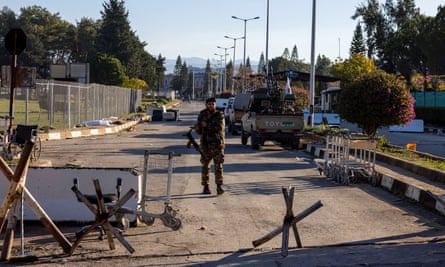[](https://www.theguardian.com/world/2024/dec/16/this-is-not-a-peaceful-country-russian-military-forms-fragile-truce-with-syrian-rebels-it-used-to-bomb#img-2) A Syrian fighter guards the entrance of the Khmeimim airbase in Latakia, Syria. Photograph: Ümit Bektaş/Reuters “We don’t feel unsafe, we are hoping to make friendly relations with the new government as soon as it becomes a legitimate government,” said a representative of the Russian military, who allowed the Guardian rare access to the Khmeimim airbase on Sunday. The representative said communications with HTS started a week ago to [coordinate military affairs between Russian forces in Syria and the country’s new leaders.](https://www.theguardian.com/world/2024/dec/09/moscow-reaches-out-to-new-syrian-leadership-in-move-to-secure-bases) “Neither side is making provocations and things have been fine,” the Russian military representative said, as he gestured to boxes of humanitarian aid and Russian ministry of defence-branded backpacks, which they said were a gift from Russia to the Syrian people. 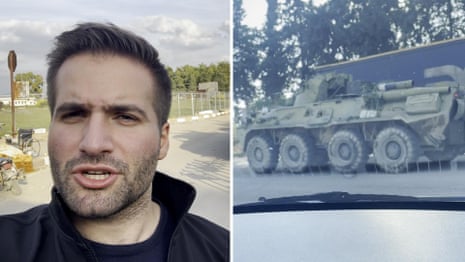 Guardian reporter watches Russian forces at Khmeimim airbase in Syria – video HTS fighters guarded the gates of the airbase as Russian Mig fighter jets took off. “We used to be scared whenever we would hear the sound of a Russian jet – now it’s become normal,” Abu Khaled, a 26-year-old HTS fighter guarding the airbase said. Outside, Russian soldiers still milled about the town of Khmeimim, shopping at stores whose signs were written in Cyrillic. Russian forces first entered Syria in 2015 when Assad requested their military assistance against opposition forces, which he had been fighting since Syria’s 2011 revolution. Now their presence in Syria has been called into question as the opposition take the reins of power. [Map](https://interactive.guim.co.uk/uploader/embed/2024/12/russian_bases_in_syria_and_control/giv-4559YgbqEbvgKHeN/) The EU foreign affairs chief, Kaja Kallas, said on Monday that Russia and Iran “should not have a place” in Syria, and said the bloc would raise the issue of Russian military bases with the country’s new leadership. HTS and Russia are at the “first step” of negotiations over if and how Russia will maintain its military bases in post-Assad Syria, an HTS official familiar with the talks told the Guardian. Both sides described the atmosphere of the negotiations as positive. [Russia wants to maintain its control over Tartous port, its only port in the Mediterranean sea and the Khmeimim airbase in Latakia, a key logistics point for its Africa operations.](https://www.theguardian.com/world/2024/dec/03/seizure-of-aleppo-threatens-moscows-foothold-in-syria-and-the-wider-region) [ Assad denies planning to flee Syria before evacuation by Moscow ](https://www.theguardian.com/world/2024/dec/16/un-envoy-calls-for-inclusive-transition-syria-rebel-leader) Though the HTS official acknowledged Russia’s role in [“bombing innocent civilians”](https://www.theguardian.com/world/2020/mar/02/russia-committed-war-crimes-in-syria-finds-un-report) in Syria since 2015, it seemed the rebel group was taking a pragmatic approach towards its relations with foreign powers. The HTS official said there would be “no red lines” in negotiations with the Russians, which would be based on “strategic interests, not ideology”. Moscow and HTS have both made their opening moves: Moscow offered humanitarian aid to Syria, which is mired in an economic and humanitarian crisis. This was refused, as HTS felt it had several foreign donors already beating on its door. In his first public comments since he was forced from power, Assad said on Monday that his first stop after fleeing Damascus was the Khmeimim airbase, where he claimed to have overseen combat operations between fleeing to Moscow. The HTS official said the new Syrian government would seek the extradition of Assad, or ask him to be turned over to the international criminal court. They added that they were not optimistic that Russia would grant either request. The primary aim of HTS appears to be establishing good economic and political relations with Russia and other international powers, which the HTS official said would confer legitimacy on the new rebel government. The official cited the hasty pullout of US forces from Afghanistan in 2021 as a lesson on what the group wanted to avoid with Russia. 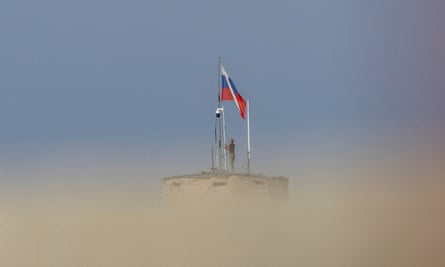[](https://www.theguardian.com/world/2024/dec/16/this-is-not-a-peaceful-country-russian-military-forms-fragile-truce-with-syrian-rebels-it-used-to-bomb#img-3) A Russian soldier stands on top of a water tower at Khmeimim airbase. Photograph: Ümit Bektaş/Reuters To that end, HTS has provided security for Russian forces over the last few days as they moved vehicles and personnel from the T4 airbase in Homs, central Syria, to Khmeimim airbase and Tartous port. Columns of Russian armoured personnel carriers, tanks and pickup trucks with the Russian flag waving and a large “Z” painted on the sides have filled Syria’s highways for the past two days, escorted by HTS fighters. [Aerial view of Khmeimim airbase](https://interactive.guim.co.uk/uploader/embed/2024/12/syria_bases_before_and_after/giv-4559ANfrSkssqTsn/) The Russian military representative confirmed that the T4 airbase in Homs had been completely emptied out of personnel and equipment by Saturday, in coordination with HTS. The representative added that troops were not withdrawing from Syria but just repositioning, while they waited for Russia’s presidency to make a decision about what to do next. Living conditions in the besieged T4 base had become dire in the last week, with refuse building up and food supplies growing low, according to the HTS official – allegations on which the Russian representative did not comment. Khmeimim airbase and Tartous port are now the only active Russian bases in Syria – a far cry from the vast military footprint Moscow maintained in the country under Assad. The question of Tartous appeared easier to resolve than the airbase, as the HTS official said the group was open to allowing the Russians to maintain their control over the port, citing international law as a complication for cancelling the 49-year lease of the naval facility – even if it was signed with the now deposed Assad regime. Whether the Syrian people would accept a continued Russian presence in the country after years of Russian jets bombing people in rebel-held territory was another question. “This is not a peaceful country, go look at Idlib and the liberated areas, they are all destroyed,” Abo Khaled said, gesturing at the Russian jets taking off from Khmeimim airbase. HTS, on its part, seems willing to turn the page on the bloody past of the Syrian civil war and focus on pulling Syria out of its miserable humanitarian state. “We are forced to repair relations, the country is dead, people are very poor. People are trying hard to stop the bloodshed, they would like to build a new life and move forward,” the HTS official said. [](https://www.theguardian.com/world/2024/dec/16/this-is-not-a-peaceful-country-russian-military-forms-fragile-truce-with-syrian-rebels-it-used-to-bomb#img-4) Smoke rises from the site of a Syrian army weapons depot hit overnight by an Israeli bombardment. Photograph: Bakr Alkasem/AFP/Getty Images Ziad Taweel, the head of the Latakia international airport that borders the Russian airbase, said HTS had instructed him to go back to work and get the civilian airport back online, but he had only been granted approval by the Russians to return on Sunday. The last civilian flight from the airport was almost two weeks ago and the exterior of the airport was littered with abandoned army vehicles and boxes of weaponry, though the interior was left untouched. As Taweel inspected the airport, escorted by balaclava-wearing Russian commandos, an HTS fighter and a soldier joked. The HTS fighter, gazing at Russian Mrap military vehicles and planes, made sure to take some selfies with the Russian military officials, before walking off the base towards his colleagues.
2024-12-18
-
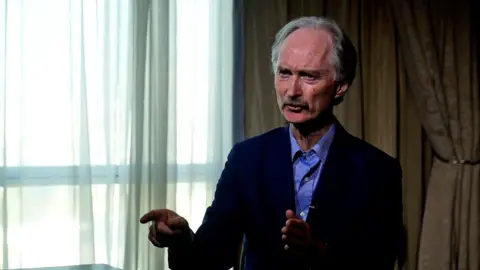BBC Geir Pedersen said the international community was ready to help and support Syria's new leadership It is vital that Syria's new leadership keeps its promises to respect the rights of all the country's diverse religious and ethnic groups, according to UN Special Envoy Geir Pedersen. Mr Pedersen, speaking to the BBC in Damascus, said Syrians were experiencing "a lot of hope and a lot of fear... at the same time". He called for all parties, inside and outside Syria, to do all they could to create stability in the country. Bashar al-Assad's regime [was overthrown less than two weeks ago](https://www.bbc.co.uk/news/articles/c99x0l1d432o) by a rebel coalition led by Hayat Tahrir al-Sham, known as HTS, a Sunni Islamist group that claims to have disavowed its jihadist extremist past since it split from al-Qaeda in 2016. HTS is designated as a terrorist organisation by the UN, the US, the EU, the UK and others. Symbolically, its leader has dropped his wartime pseudonym of Abu Mohammed al-Jolani and [reverted to his real name of Ahmed al-Sharaa](https://www.bbc.co.uk/news/articles/c0q0w1g8zqvo). Sunni Muslims are a majority in Syria, which has a strong secular tradition. Sharaa insists HTS is a religious nationalist movement prepared to tolerate other groups. Mr Pedersen said Sharaa has said "many positive things". But some Syrians, he said, did not believe the HTS leader, who until 2016 had a long history as a jihadist extremist. "I must be honest. I'm hearing from many Syrians that they're asking questions whether this will actually be implemented. They've got their doubts." That, he said, was not surprising, given the speed of change in Syria. "If the transition is to succeed, this needs to be a process that is co-operative." "\[Sharaa\] needs to work with the different armed factions that went in together with him. He needs to work with a broader group of former opposition. He needs to make sure that he's working with a broad group of civil society women. And as we all agree with the broadest spectrum possible of Syrian society." Mr Pedersen, who has been the UN special envoy since 2018, said the international community was ready to help and support Syria's new leadership. He emphasised that hopes of lifting sanctions on Syria and taking HTS off the terrorist list depended on its behaviour. He hoped to give it the benefit of the doubt for three months - the time HTS has said its interim government will rule before a more long-term arrangement. "I think there is an understanding that for Syria really to be successful, we need to see a delisting, and we need to see sanctions lifted. But I think also it's very important that it's understood that this will not just happen because everyone wants positive things." "Member states are following very carefully what will be happening on the ground, but I do believe that if what has been said in public is actually being implemented in practice, yes, then I think we can see the delisting and the end of sanctions." 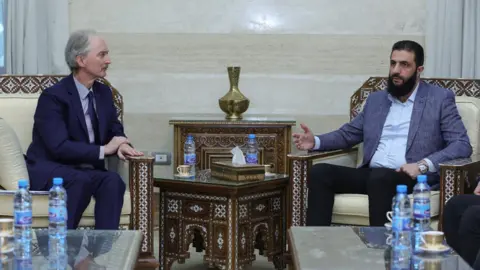SANA Geir Pedersen held talks with HTS leader Ahmed al-Sharaa earlier this week As for Syria's neighbours, Mr Pedersen said that Israel's actions since the fall of Assad had been "highly irresponsible". Since the 1967 Middle East war, Israel has occupied and later annexed the area of southern Syria known as the Golan Heights. Most other states, other than the US, consider the Golan to be occupied land. Israel's current bombing campaign against Syrian military facilities and its occupation of more Syrian land in the Golan Heights demilitarised buffer zone and neighbouring areas were, Mr Pedersen said, "a danger to the future of Syria, and these activities need to stop immediately". "There is no reason that Israel should occupy new Syrian territory. The Golan is already occupied. They don't need new land to be occupied. So what we need to see is that also Israel acts in a manner that don't destabilise this very, very fragile transitional process," he added. Mr Pedersen is also concerned about the complex web of power in northern Syria. Turkey has a well-established relationship with HTS. It has troops in the north-west, as well as a militia known as the Syrian National Army (SNA), made up of rebel factions that it backs. Since Assad was overthrown, the SNA has attacked the other force in Syria's north, a Kurdish-led militia alliance called the Syrian Democratic Forces (SDF) which is supported by the US. Mr Pedersen said it was Turkey's interests to follow certain key principles, along with other foreign powers. "What is it that we all need to see in Syria now? We need to see stability. We need to see that there are not new population groups that are displaced. We need to see that people are not running away from Syria as refugees. We need to see that refugees are returning, that... internally displaced can be returning to their homes." After 54 years under the rule of two authoritarian Assad presidents, Syria is fragmented, with towns and villages heavily damaged by almost 14 years of war and a population traumatised by war and the deadly cruelty of the regime. Mr Pedersen said it was vital for HTS to start a process that will bring justice to all the families of more than 100,000 Syrians who disappeared after detention by the regime since 2011. Most are presumed dead. "If this process is not moving in the right direction, there is a huge danger that this anger can erupt in a manner that is in no one's interest." Syrians, Mr Pedersen said, wanted to own the process of rebuilding their country. That might be difficult given the turbulence across the Middle East and propensity of Syria's neighbours and other big powers to interfere. Time is short. If HTS keeps its promises, "within the next few weeks and months there is hope that Syria can have a bright future", he said. He warned that if that doesn't happen, "there is also a danger of new strife and even civil war." "But we need to bet that the future for Syria can now be fixed. And that we can start the process of healing."
2025-01-08
-
Iran’s top ranking general in Syria has contradicted the official line taken by Iran’s leaders on the sudden downfall of their ally Bashar al-Assad, saying in a remarkably candid speech last week that Iran had suffered a major defeat but would still try to operate in the country. An audio recording of the speech, given last week by Brig. Gen. Behrouz Esbati at a mosque in Tehran, surfaced publicly on Monday in Iranian media, and was a stark contrast to the remarks of Iran’s president, foreign minister and other top leaders. They have for weeks downplayed the magnitude of Iran’s strategic loss in Syria last month, when rebels swept Mr. al-Assad out of power, and said Iran would respect any political outcome decided by Syria’s people. “I don’t consider losing Syria something to be proud of,” said General Esbati according to the audio recording of his speech, which [Abdi Media,](https://abdimedia.net/podcast/listen-uncensored-file-revelations-and-above-controversial-remarks-general-aftabati-one) a Geneva-based news site focused on Iran, published on Monday. “We were defeated, and defeated very badly, we took a very big blow and it’s been very difficult.” General Esbati revealed that Iran’s relations with Mr. al-Assad had been strained for months leading to his ouster, saying that the Syrian leader had denied multiple requests for Iranian-backed militias to open a front against Israel from Syria, in the aftermath of the Hamas-led attack of Oct. 7, 2023. Iran had presented Mr. al-Assad with comprehensive military plans on how it could use Iran’s military resources in Syria to attack Israel, he said. The general also accused Russia, considered a top ally, of misleading Iran by telling it that Russian jets were bombing Syrian rebels when they were actually dropping bombs on open fields. He also said that in the past year, as Israel struck Iranian targets in Syria, Russia had “turned off radars,” in effect facilitating these attacks. Thank you for your patience while we verify access. If you are in Reader mode please exit and [log into](https://myaccount.nytimes.com/auth/login?response_type=cookie&client_id=vi&redirect_uri=https%3A%2F%2Fwww.nytimes.com%2F2025%2F01%2F08%2Fworld%2Fmiddleeast%2Firan-general-syria-defeat.html&asset=opttrunc) your Times account, or [subscribe](https://www.nytimes.com/subscription?campaignId=89WYR&redirect_uri=https%3A%2F%2Fwww.nytimes.com%2F2025%2F01%2F08%2Fworld%2Fmiddleeast%2Firan-general-syria-defeat.html) for all of The Times. Thank you for your patience while we verify access. Already a subscriber? [Log in](https://myaccount.nytimes.com/auth/login?response_type=cookie&client_id=vi&redirect_uri=https%3A%2F%2Fwww.nytimes.com%2F2025%2F01%2F08%2Fworld%2Fmiddleeast%2Firan-general-syria-defeat.html&asset=opttrunc). Want all of The Times? [Subscribe](https://www.nytimes.com/subscription?campaignId=89WYR&redirect_uri=https%3A%2F%2Fwww.nytimes.com%2F2025%2F01%2F08%2Fworld%2Fmiddleeast%2Firan-general-syria-defeat.html).
2025-02-03
-
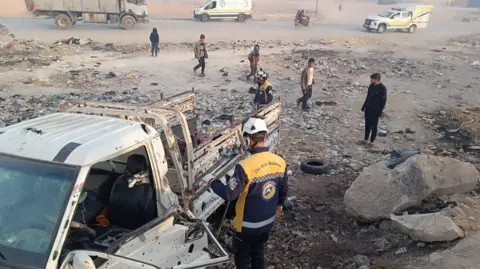Syria Civil Defence The Syria Civil Defence said some of the 15 wounded were in a critical condition At least 15 people, 14 of them women, have been killed in a car bomb attack on a vehicle transporting agricultural workers in northern Syria, first responders say. Another 15 women were wounded by the blast on the outskirts of the city of Manbij, east of Aleppo, according to the Syria Civil Defence agency, also known as the White Helmets. It said some of the wounded were in a critical condition and warned that the death toll might rise. There was no immediate claim from any armed groups for the bombing, which was the deadliest since rebel forces overthrew president Bashar al-Assad in December. It was also the second car bomb attack in Manbij in only three days. On Saturday, two children and a woman were among four people killed by an explosion on a street in the city centre, the Syria Civil Defence said. The Syrian Observatory for Human Rights, a UK-based monitoring group, reported that the blast was near a military position and that nine people were killed, including several pro-Turkish fighters. Since the collapse of the Assad regime, Manbij and its surrounding area have seen intense clashes between Turkish-backed Syrian National Army (SNA) factions and the Kurdish-led Syrian Democratic Forces (SDF), which is supported by the US. The SNA launched an offensive to capture territory west of the River Euphrates, which the SDF had held since driving out the jihadist group Islamic State (IS) in 2016. The SNA took control of Manbij on 9 December, after fighters from the SDF-affiliated Manbij Military Council withdrew. But since then, the SDF has been carrying out a counter-offensive.
2025-02-17
-
Five suspected Islamist terrorists accused of kidnapping and torturing four French journalists covering the war in [Syria](https://www.theguardian.com/world/syria) have gone on trial in Paris. The men include the French jihadist Mehdi Nemmouche, 39, who is serving life imprisonment for an attack on a Jewish museum in Brussels in 2014 in which four people died. The five are charged with being part of an Islamic State group that [held the journalists](https://www.theguardian.com/world/2014/apr/20/kidnapped-french-journalists-released-syria), as well as dozens of others including humanitarian workers, between 2013 and 2014. On Monday, as he appeared in court to give his name, Nemmouche denied having been the journalists’ captor. “I was never the jailer of the western hostages or any other hostage, and I never met these people in Syria,” he told the Paris court, breaking his silence after not speaking throughout the Brussels trial or during the investigation. All four journalists have told investigators they are sure Nemmouche was their jailer. During what is seen as a historic trial in [Europe](https://www.theguardian.com/world/europe-news), the court will hear details of the psychological and physical torture allegedly inflicted on the journalists, as well as the wider general treatment of hostages by the IS group in Syria, where 27 western reporters and humanitarian workers were kidnapped between 2012 and 2014. Eight were killed – three Americans, two Britons, two Japanese and a Russian – while three others, including two women, remain missing, presumed dead. The foreign correspondent Didier François and the photographer Édouard Elias were working for the French radio station Europe 1 when they were kidnapped near Aleppo on 6 June 2013, shortly after crossing into Syria from Turkey. Two weeks later Nicolas Hénin, a reporter with Le Point magazine, and the photographer Pierre Torres were taken hostage by armed and masked men in the city of Raqqa. All four were released in April 2014 after 10 months in captivity. The trial that opened in Paris on Monday comes after French investigators carried out a 10-year inquiry stretching across more than a dozen countries. In the dock alongside Nemmouche are Abdelmalek Tanem, 35, a French national accused of being another IS jailer, and a Syrian man, Kais Al Abdallah, 41, who is accused of having helped the terror group to kidnap the journalists. Both have denied the charges. Also on trial but not present in court are the high-ranking IS leader Oussama Atar, previously convicted in absentia for coordinating the wave of terrorist attacks in Paris in November 2015, including at the Bataclan concert hall, and Salim Benghalem, accused of being in charge of the terrorist group’s hostage-holding operation. Both are reported to have died in Syria. The prosecutor’s office accuses the five of running a “hostage factory” and “torture training centres” in which those being held were subject to psychological and physical punishment. On his release François recounted how Nemmouche had crushed his fingers and pulled out his nails. Hénin said the jihadist had made him kneel in front of a wall and prepare to be decapitated. At the opening of the trial on Monday, Nemmouche said the first time he saw Hénin “was at the court in Brussels”. Hénin said the IS cell treated Syrian captives even worse than the westerners. “The Syrian prisoners were terrified of being tortured by the jihadists who would scream at them in French,” he said, adding that local prisoners were often suspended on hooks and had their throats cut. “We asked ourselves if we would be next, they said we would end up having our heads cut off,” Hénin added. The former hostages told investigators they had recognised Nemmouche as one of their jailers, who had called himself Abu Omar, when he was arrested after the bombing in Belgium and his photograph circulated in the press. They told police Nemmouche was “talkative”, “perverse” and “committed to religious ethnic cleansing”. A number of other convicted jihadists, including one in jail in the US, are expected to give evidence in the trial, which will continue for five weeks.
2025-04-04
-
Israel has restarted ground operations in the northern Gaza Strip and killed at least 25 people in airstrikes on the southern city of Khan Younis in what it says is a renewed military campaign aimed at pressuring Hamas into releasing Israeli hostages. At least 25 people were killed in the attack on Khan Younis early on Friday, the local Nasser hospital told AFP, as the search for survivors continued. More than 1,250 Palestinians in the besieged territory have been killed in Israeli bombings since 18 March, including at least 100 people on Thursday alone in airstrikes [that hit three schools turned shelters](https://www.theguardian.com/world/2025/apr/03/at-least-27-killed-in-israeli-bombing-of-shelter-in-gaza-city-rescuers-say). The Israel Defense Forces (IDF) said the targets were Hamas control centres. [](https://www.theguardian.com/world/2025/apr/04/israel-restarts-ground-operations-gaza-strip-hamas-hostages-airstrikes-lebanon-syria#img-2) The search continues for survivors of an Israeli airstrike on Khan Younis, in the southern Gaza Strip, early on Friday. Photograph: Mariam Dagga/AP According to the UN, 280,000 people have been forced to leave their homes or shelters since Israel decided to abandon a two-month-old ceasefire with [Hamas](https://www.theguardian.com/world/hamas), cutting off aid and fuel on 2 March and resuming large-scale bombing two weeks later. Ground troops have since re-entered the strip’s southernmost city of Rafah and the Netzarim corridor that cuts off [Gaza](https://www.theguardian.com/world/gaza) City from the rest of the territory. On Friday, the IDF said troops were advancing in Shuja’iya, a northern suburb of Gaza City. Israeli officials vowed this week to [seize large swathes of the strip](https://www.theguardian.com/world/live/2025/apr/02/israel-gaza-war-idf-hamas-live-updates-latest-news) as security zones and establish a new military corridor between Rafah and Khan Younis, exacerbating Palestinian fears of permanent displacement and annexation. Friday also saw escalations on other fronts in the regional conflagration set in motion by Hamas’s October 2023 attack on southern Israel. Israel says 1,200 people, the majority of them civilians, were killed and a further 250 taken captive in the attack; all but 59 have since been released in hostage and detainee swaps. Israel’s retaliatory military campaign on Gaza has killed at least 50,600 people, most of them civilians, according to the territory’s health ministry. In Lebanon on Friday, the Israeli military said it had killed Hassan Farhat, a senior Hamas commander, in an airstrike on the southern city of Sidon, a move that threatens to upset the fragile truce signed in November with the Hamas-allied Lebanese militant group [Hezbollah](https://www.theguardian.com/world/hezbollah). 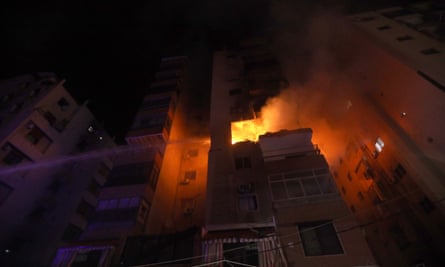[](https://www.theguardian.com/world/2025/apr/04/israel-restarts-ground-operations-gaza-strip-hamas-hostages-airstrikes-lebanon-syria#img-3) Firefighters tackle a blaze at an apartment block in Sidon, Lebanon, after an airstrike by Israeli forces. Photograph: Mohammad Abushama/Anadolu/Getty Images The bombing came after Israel targeted what it said were Hezbollah facilities in the Lebanese capital, Beirut, last week [for the first time since the ceasefire](https://www.theguardian.com/world/2025/mar/28/israel-dahiyeh-beirut-lebanon-hezbollah) went into effect. That attack was launched in response to rocket fire aimed at northern Israel, which neither Hamas nor Hezbollah claimed responsibility for. Tensions between Israel and the new transitional government in [Syria](https://www.theguardian.com/world/syria) are also rising after a wave of Israeli airstrikes across the country and a deepening Israeli ground incursion in the Daraa border area on Thursday, in which 13 people were killed. Israel has long targeted Hezbollah and Iranian assets in Syria but has continued its bombing campaign since Islamist-led rebel groups forced the dictator Bashar al-Assad to flee the country in December. It has also seized land in southern Syria and warned that Islamist groups must stay away from Israeli territory. Hakan Fidan, the foreign minister of Turkey, which backs the new regime in Damascus, on Friday accused Israel of fuelling regional instability. “Israel is taking out, one by one, all these capabilities that a new state can use against Isis and other terrorist threats,” he said in an interview on the sidelines of a Nato summit in Brussels. “What Israel is doing in Syria is not only threatening the security of Syria, but also is paving the way for future instability of the region.” Also on Friday, the Israeli army confirmed troops killed a Palestinian teenager after shooting at a group of boys and young men throwing stones near the occupied West Bank village of Husan the night before. Palestinian officials gave his name as Yusef Zaoul, 17. The IDF did not comment on the deceased’s name or age.
-
Lucy Williamson BBC Middle East correspondent A growing confrontation between Israel and Turkey over influence in Syria is posing a serious challenge for Syria's fragile new government. On Wednesday night, Israel bombed several military targets in Syria, including two airports – Hama military airport and the T4 base near Homs. Syria's foreign ministry said the bombardment virtually destroyed the Hama base. A prominent Syrian human rights group said four defence ministry employees were killed, and a dozen other people injured. [The air strikes hit Syria](https://www.bbc.co.uk/news/articles/ce92g5nk55eo), but their real target was Turkey. Shortly afterwards, Israel's foreign minister accused Turkey of playing a "negative role" in Syria, and Israel's defence minister warned Syria's interim president, Ahmed al-Sharaa, that he would "pay a very heavy price" if he allowed "hostile forces" to enter his country. Ankara is currently negotiating a joint defence pact with Sharaa's new government, and there have been widespread reports that Turkey is moving to station aircraft and air defence systems at Syria's T4 and Aleppo airbases. Some analysts compared Israel's intense air strikes on Hama airport this week with the much lighter bombing on the edge of the T4 base, suggesting that Turkey may have already moved some equipment there and that Israel was calibrating its attack to avoid a full-blown escalation. Relations between Israel and Turkey have nose-dived since the Gaza war began in October 2023, with Ankara introducing trade restrictions and accusing Israel of genocide. That regional tension is now playing out on new ground in Syria. After the air strikes on Wednesday, Turkey's foreign ministry accused Israel of destabilising the region by "both causing chaos and feeding terrorism" and said it was now the greatest threat to the security of the region. But foreign minister Hakan Fidan told Reuters news agency that his country was not seeking confrontation with Israel, and that Syria could set its own policies with its southern neighbour. Syria's new leader has repeatedly signalled that he was not looking for confrontation with Israel. Soon after sweeping President Bashar al-Assad from power last December, he told the BBC that Syria would not pose a threat to any country. He has even left the door open to normalising diplomatic relations with Israel in the future, telling the Economist last month that Syria wanted peace with all parties, but that it was too early to discuss such a sensitive issue. His top priority since taking power has been to unite a bitterly divided Syria, and pacify external relations with its neighbours, while he cements his power and control. But Israel has not made that easy. Its military interventions in Syria are fuelling conflict with both external powers like Turkey, and with internal groups like jihadists in the country's south. Once an implacable enemy of Syria's former president and his Iranian ally, Israel is also suspicious of Sharaa, a man who once led the Syrian branch of al-Qaeda and whose new government is backed by Turkey. Since he took power, Israel's military has repeatedly pounded Syrian weapons stores, airfields and other military sites left by the former regime, to avoid them falling into enemy hands, it says. It has also occupied a demilitarised buffer zone, set up after the 1973 Arab-Israeli war, and has sent forces onto the Syrian side of a nearby mountain, setting up nine bases across the area. Israeli troops are also making regular incursions into Syria's south-western provinces, vowing to prevent the presence of any armed groups or government forces there. Earlier this week, the local government in the southern city of Deraa said nine civilians were killed in an Israeli bombardment, during the deepest incursion there yet by Israeli forces. Another four people were killed in Israeli shelling near the village of Koya late last month, after local gunmen tried to stop the advance of Israeli forces there. Since then, mosques in both Deraa and Damascus have reportedly called for jihad against Israeli forces. Charles Lister, head of the Syria Programme at the US-based Middle East Institute, which studies the region, has counted more than 70 ground incursions into south-west Syria since February, describing this as "an extraordinarily dangerous moment – and an unnecessary one". Since the fall of Assad four months ago, he says, not one attack has targeted Israel from Syria, the country's security forces have intercepted "at least 18 weapons shipments destined for Hezbollah in Lebanon, and dismantled at least eight formerly Iranian-linked rocket launch sites". Many Syrians are disappointed by Israel's response to their new government. They watched for years as Israel targeted the Assad regime, and believed that Assad's fall would bring the chance for a less confrontational relationship with Israel. Some say that view is now changing. "We used to believe that the Israeli army was only targeting Assad's regime forces," said Ismail, a restaurant owner in the west of the country. "But its continued, incomprehensible bombings are sadly making us think that Israel is an enemy of the Syrian people." Syria is vulnerable because its internal divisions are easily inflamed by regional and global interventions. The roots of sectarian conflict run deep here, nourished by decades of repressive rule by the Assad family, members of Syria's Alawite minority. Ahmed al-Sharaa's attempts to reassure the country's minorities were interrupted in early March by an explosion of violence in Syria's coastal region – a stronghold of the former regime. At least 1,000 Alawite civilians or disarmed fighters were massacred by pro-government forces, after government units were ambushed in a co-ordinated attack led by remnants of Syria's former armed forces. Those former armed forces were once backed by Iran. Some analysts believe their remnants may still be receiving some support from Tehran. Syrians celebrated the fall of Bashar al-Assad as an end to their civil war, and a chance to unite. But outside powers helped fuel that civil war for more than a decade, and its neighbours are now eyeing the vacuum left by Assad. The risk is growing that Syria will again fall victim to the conflicts of outside powers, played out on Syrian soil.
2025-04-11
-
Israel’s military is organising hiking tours for civilians in newly occupied Syrian territory during the Passover holiday, local media has reported. The twice-daily tours in the contested [Golan Heights](https://www.theguardian.com/world/2024/dec/11/golan-heights-israeli-troops-syria-assad) will run for a week beginning this Sunday. Tickets sold out almost immediately. Under a military escort in bulletproof buses, small groups will travel up to 2.5km into Syrian territory that was off limits until the Israel Defense Forces (IDF) seized the Golan buffer zone after [the fall of the Syrian dictator Bashar al-Assad in December](https://www.theguardian.com/world/2024/dec/08/syrians-celebrate-fall-of-bashar-al-assad-after-five-decades-of-dynastic-rule). Israel has occupied the Golan Heights since 1967 and now controls hundreds more square kilometres of Syrian land. The itinerary includes the Syrian side of Mount Hermon, which overlooks Damascus, and Lebanon’s Shebaa Farms at the foot of the mountain. The Israeli-occupied strip of Lebanese land, reputedly the site of God’s covenant with Abraham, has been a flashpoint for violence between Israel and the Lebanese militant group Hezbollah for decades. Visitors will also be able to hike and swim in the Ruqqad river valley which flows into the Yarmouk on the border with Jordan, and see parts of the abandoned Ottoman Hejaz railway, which used to connect the empire’s capital in Istanbul to Haifa, Nablus and holy sites in present day Saudi Arabia. The trips have been organised by the IDF’s 210th Division, the Golan regional council, the Keshet Yehonatan religious education centre, the environmentalist Golan Field School and the Israel nature and parks authority, the Yedioth Ahronoth newspaper reported. The tours are part of a wider initiative, “Returning to a Safer North”, after the end of last year’s Israel-Hezbollah war, which was part of the regional fallout ignited by Hamas’s October 2023 attack on Israel and the ensuing war in the Gaza Strip. The Israeli military said: “It’s important for us to restore heritage and tourism to the region and to tell the story of the battles fought during the war.” Tourists sign up at their own risk and the trips may be cancelled at short notice if there are security issues. In response to questions from Israeli newspaper Haaretz, the IDF said that the tour was “inside Israel”, rather than Syria, although the visits take place in the Golan Heights demilitarised buffer zone, internationally recognised as Syrian territory. [The IDF began a heavy bombing campaign across Syria](https://www.theguardian.com/world/2025/feb/25/israel-strikes-targets-in-southern-syria-after-demanding-demilitarisation) targeting the regime’s weapons stockpiles shortly after Assad fled the country, while ground troops advanced in violation of a 1974 agreement. [Benjamin Netanyahu](https://www.theguardian.com/world/benjamin-netanyahu), Israel’s prime minister, has demanded that forces belonging to Syria’s new Islamist-led transitional government stay away from the border area and that the IDF remain until an alternative arrangement can be found. Given demand, organisers have said that they hope the security situation will permit additional tours to Syria after Passover.
2025-05-02
-
Israeli warplanes have carried out a series of airstrikes outside Damascus and across Syria, after warnings from Israeli officials that the country would intervene to protect the Syria’s minority Druze sect. The airstrikes targeted a Syrian military site in the Damascus suburb of Harasta, as well as hitting unknown targets in Deraa province in south [Syria](https://www.theguardian.com/world/syria) and Hama province in north-west Syria. At least one civilian was killed and four people were injured as a result of the Israeli bombings late Friday night, according to Syrian state media. The latest round of strikes come after Israel killed four civilians earlier on Friday in a bombing in southern Syria and struck the vicinity of Syria’s presidential palace. Syria’s new rulers had [angrily denounced the raids launched by Israel’s air force against unidentified targets near the presidential palace earlier in the day](https://www.theguardian.com/world/2025/may/02/israel-launches-airstrikes-near-syria-presidential-palace-in-damascus), warning of a “dangerous escalation”. Syria’s presidency called the strike “a dangerous escalation against state institutions and its sovereignty” and accused Israel of destabilising the country. Israeli officials said the attacks were intended to send a message to the Syrian government after days of bloody clashes near Damascus between pro-government militia forces and fighters from the Druze minority sect. Benjamin Netanyahu, Israel’s prime minister, and the defence minister, Israel Katz, said in a joint statement that the attack early on Friday, the second this week in Syria, was intended to deter the country’s new leadership from any hostile move against the Druze. “This is a clear message to the Syrian regime. We will not allow the deployment of forces south of Damascus or any threat to the Druze community,” the statement said. The Israeli army confirmed in a statement that fighter jets struck near to the area of the palace of the president, Ahmed al-Sharaa, in Damascus but gave no further details. Israel has said that it will protect the Druze religious minority in Syria, a declaration that most Druze leaders have rebuffed. The head of the UN Independent International Commission of Inquiry on Syria condemned the Israeli strikes in an interview with Al Jazeera on Friday. ”The Israeli attacks on Syria are absolutely unacceptable. There is nothing in international law that allows for pre-emptive bombing,” said Paulo Sérgio Pinheiro, the chair of the commission. The government in Damascus took power after ousting Bashar al-Assad in December last year and is dominated by the militant group Hayat Tahrir al-Sham, which has its roots in the al-Qaida jihadist network. Though Syria’s new rulers have promised inclusive rule in the multi-confessional, multi-ethnic country, they face pressures from extremists within their own ranks. [Clashes broke out in Druze-majority areas outside Damascus](https://www.theguardian.com/world/2025/apr/30/deadly-syria-clashes-continue-for-second-day-outside-damascus) on Tuesday after an audio clip circulated on social media of a man making derogatory comments about the prophet Muhammad. The clip, which was falsely attributed to a Druze cleric, angered many Sunni Muslims, but may have been fabricated. On Thursday, one of the three Syrian Druze spiritual leaders, Sheikh Hikmat al-Hijri, accused Syria’s government of what he called an “unjustified genocidal attack” on the minority community. Hijri released a statement calling for international protection for the Druze in southern Syria, asking international forces to “intervene immediately”. The two other Syrian Druze religious leaders chose to negotiate with Damascus directly and rejected calls for international intervention in Syria. [skip past newsletter promotion](https://www.theguardian.com/world/2025/may/02/israel-says-airstrikes-in-syria-are-message-to-protect-druze-minority#EmailSignup-skip-link-15) Sign up to Global Dispatch Get a different world view with a roundup of the best news, features and pictures, curated by our global development team **Privacy Notice:** Newsletters may contain info about charities, online ads, and content funded by outside parties. For more information see our [Privacy Policy](https://www.theguardian.com/help/privacy-policy). We use Google reCaptcha to protect our website and the Google [Privacy Policy](https://policies.google.com/privacy) and [Terms of Service](https://policies.google.com/terms) apply. after newsletter promotion A UK-based monitoring group, the Syrian Observatory for Human Rights, said 56 people in Sahnaya and the Druze-majority Damascus suburb of Jaramana were killed, including local armed fighters and security forces. The Druze religious sect began as a 10th-century offshoot of Ismailism, a branch of Shia Islam. More than half of the roughly 1 million Druze worldwide live in Syria, largely in the southern Sweida province and some suburbs of Damascus. Most of the other Druze live in Lebanon and Israel, including in the Golan Heights, which Israel captured from Syria in the 1967 war and annexed in 1981. The Syrian government has denied that any of its security forces were involved in the clashes with the Druze, which followed a wave of massacres in March when [security forces and allied groups killed more than 1,700 civilians](https://www.theguardian.com/world/2025/mar/15/the-streets-are-empty-no-one-dares-go-outside-syrias-alawites-terrorised-by-revenge-killings), mostly from Bashar al-Assad’s Alawite community, according to the Syrian Observatory for Human Rights. Since the fall of Assad’s regime in December, Israel has launched repeated airstrikes on Syria, destroying military hardware and stockpiles, in what it says is defence of the Druze. Israel has also sent troops to what was a demilitarised zone in the Golan Heights, on Syria’s south-west border with Israel, seizing key strategic terrain where Syrian troops were once deployed. Analysts in Israel say the strategy aims to undermine the new Syrian government while also protecting and so co-opting a potential proxy ally within the country. The strategy is controversial, however, with some officials arguing that a stable Syria would better serve Israel’s interests. The Syrian president, Sharaa, told a visiting US congressman last week that Damascus wanted to normalise ties with Israel.
2025-06-22
-
A suicide bombing by [Islamic State](https://www.theguardian.com/world/islamic-state) (IS) targeting a church in Damascus has killed 22 people and wounded 63, Syrian state media have said. The attack on Sunday night was the first major IS operation and the first suicide bombing in Syria since former Syrian president Bashar al-Assad was toppled in December and replaced by an Islamist-led government. A man affiliated with IS entered the Greek Orthodox Saint Elias church in the old Christian quarter of Damascus during prayers, opened fire and then detonated an explosive vest while inside the church, Syria’s interior ministry said. Eyewitnesses inside the church reported a second gunman who did not blow himself up, but also shot at the 150 or so worshippers present. “People were praying safely under the eyes of God,” said Fadi Ghattas, who said he saw at least 20 people killed. “There were 350 people praying at the church.” Videos of the church’s interior show splintered pews overturned by the force of the blast and the bloodied corpses of congregants splayed out across the church. Nearby residents reported hearing a large blast and then the sound of sirens as security forces attempted to establish a cordon around the area and civil defence personnel headed towards the church. Issam Nasr, who was praying at the church, said he saw people “blown to bits”. “We have never held a knife in our lives. All we ever carried were our prayers,” he said. The attack came after months of low-level IS activity and propaganda, as the group attempted to exploit the security vacuum created after the fall of Assad to reconstitute itself. Syrian officials have said the group was able to seize weaponry and ammunition left by fleeing Assad regime soldiers to bolster its caches. [](https://www.theguardian.com/world/2025/jun/22/islamic-state-suicide-bombing-damascus-church-multiple-deaths#img-2) The blast on Sunday killed 20 people and damaged the interior of Saint Elias’s church, splintering pews and scattering debris. Photograph: Mohammed Al Rifai/EPA The Syrian government, led by former leaders of the Islamist rebel group Hayat Tahrir al-Sham (HTS), have been carrying out anti-IS raids throughout the country since taking power. While still a rebel group, HTS had been fighting IS in areas under its control, viewing it as a source of instability and radicalisation for rival rebel groups. Since the fall of the Assad regime, IS has attempted to use the apparent moderation of the former Islamist rebels who now lead the country as a recruitment tool for disaffected Islamist fighters. IS social media channels and propaganda published pictures of the Syrian president, Ahmed al-Sharaa, meeting the US president, Donald Trump, in Riyadh in May, describing it as an apparent betrayal of his jihadist roots. Syrian authorities have stressed religious minorities will be protected under their rule. Security personnel usually are posted at each entrance of the city’s Christian quarter, inspecting cars as they come in. The Syrian minister of information, Hamza al-Mustafa, said: “This cowardly act contradicts the values of citizenship that unite us all. We, as Syrians, emphasise the importance of national unity and civil peace, and call for strengthening the bonds of fraternity between all components of society.” 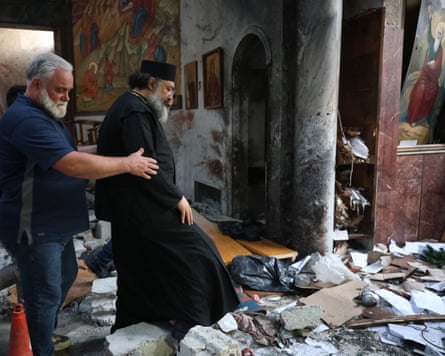[](https://www.theguardian.com/world/2025/jun/22/islamic-state-suicide-bombing-damascus-church-multiple-deaths#img-3) A clergyman walks among debris at the scene of a suicide bombing at the Saint Elias church in Damascus, Syria on 22 June. Photograph: Mohammed Al Rifai/EPA The Damascus municipality said security services were investigating the circumstances of the bombing. Syria’s foreign ministry described the event as a “desperate attempt to undermine national coexistence and to destabilise the country”. A statement from the office of the UN special envoy for Syria, Geir Pedersen, said he was outraged at the “heinous crime” and condemned it in the “strongest possible terms”. The office added that the envoy also called for “a full investigation and action by the authorities”. Though nominally in power of most of Syria, the country’s new government has struggled to extend its control on the ground over the country. Syria is still full of militias, some of them more radical than others. The country’s defence ministry is in the process of folding militias into a unified national army and disarming those who refuse to join its ranks. Since the territorial defeat of the so-called caliphate of IS in Syria, it has been mostly the US-backed, Kurdish-led Syrian Democratic Forces (SDF) that have been leading the anti-IS fight. Cooperation between the SDF and the new Syrian government in fighting IS has been growing but is still in its infancy. The US, as well as the other members of the anti-IS coalition in Iraq and Syria, have cited the resurgence of IS in Syria as one of their key concerns for the country.
-
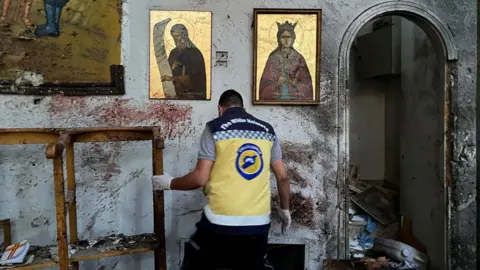Reuters Pictures from inside Mar Elias Church showed a heavily damaged altar, pews covered in broken glass and a bloodied floor At least 22 people have been killed and 63 others wounded in a suicide bomb attack at a church in Damascus, Syria's health ministry has said. A man opened fire with a weapon at the Greek Orthodox Church of the Prophet Elias in the Dweila neighbourhood during a service on Sunday evening before detonating an explosive vest, according to the interior ministry. It said the attacker was affiliated with the jihadist group Islamic State (IS). There was no immediate claim from the group itself. Photos and video from inside the church showed a heavily damaged altar, pews covered in broken glass and blood spattered across the walls. Witness Lawrence Maamari told AFP news agency that "someone entered \[the church\] from outside carrying a weapon" and began shooting. People "tried to stop him before he blew himself up", he added. Another man who was in a nearby shop said he heard gunfire followed by an explosion that sent glass flying. "We saw fire in the church and the remains of wooden benches thrown all the way to the entrance," Ziad said. It was the first such attack in Damascus since Islamist-led rebel forces overthrew Bashar al-Assad in December, ending 13 years of devastating civil war. 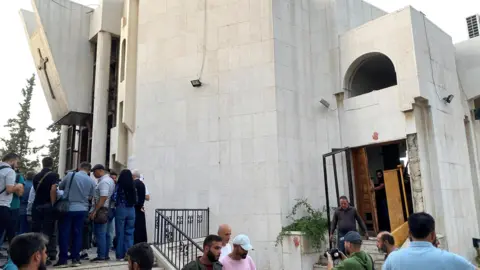Reuters The church is not far from the eastern Bab Sharqi gate of Damascus's Old City The Greek Orthodox Patriarchate of Antioch said in a statement: "The treacherous hand of evil struck this evening, claiming our lives, along with the lives of our loved ones who fell today as martyrs during the evening divine liturgy." According to initial information, the bomb blast occurred at the entrance to the church, resulting in the deaths of people who were both inside the building and in the immediate vicinity, it added. The patriarchate called upon Syria's interim authorities to "assume full responsibility for what has happened and continues to happen in terms of violation against the sanctity of churches, and to ensure the protection of all citizens". Interior Minister Anas Khattab said specialised teams from his ministry had begun investigating the circumstances of what he called a "reprehensible crime". "These terrorist acts will not stop the efforts of the Syrian state in achieving civil peace," he added. The office of UN special envoy for Syria, Geir Pedersen, condemned the attack and urged Syrians "to unite in rejecting terrorism, extremism, incitement and the targeting of any community". US special envoy Tom Barrack said: "These terrible acts of cowardice have no place in the new tapestry of integrated tolerance and inclusion that Syrians are weaving." 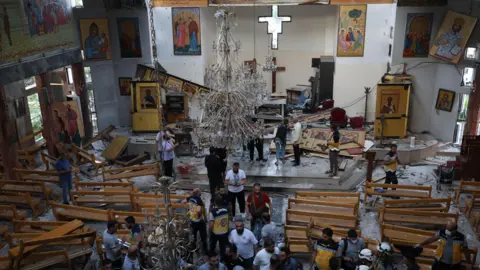EPA The Greek Orthodox Church condemned the attack and urged Syria's interim authorities to "assume full responsibility" Interim President Ahmed al-Sharaa - whose Sunni Islamist group, Hayat Tahrir al-Sham (HTS), is a former al-Qaeda affiliate in Syria and is designated as a terrorist organisation by the UN, US and UK - has repeatedly promised to protect religious and ethnic minorities. However, Syria has been rocked by two waves of deadly sectarian violence in recent months. IS has frequently targeted Christians and other religious minorities in Syria. In 2016, the group claimed a series of blasts near the Shia Muslim Sayyida Zeinab shrine in a southern suburb of Damascus, which killed more than 70 people. IS once held 88,000 sq km (34,000 sq miles) of territory stretching from western Syria to eastern Iraq and imposed its brutal rule on almost eight million people. Despite the group's military defeat in Syria in 2019, the UN has warned that the threat posed by IS and its affiliates remains high. A report published in February warned that the group might take advantage of the transition in Syria to surge attacks and make the country a renewed hub for recruiting foreign fighters. It estimated that IS had between 1,500 and 3,000 fighters in Syria and neighbouring Iraq, with most of them, including key leaders, based in Syrian territory. About 300 fighters were based in the central Badia desert, which served as a centre for planning external operations, it said. More than 9,000 IS fighters are being detained prisons spread across north-eastern Syria and 40,000 other people linked to IS, mostly women and children, are held in several camps.
2025-07-17
-
Tess Mallinder Heron BBC Monitoring 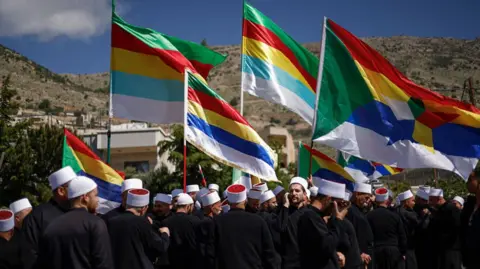Getty Images **A fresh wave of deadly sectarian violence has rocked Syria, putting into focus the country's fragile security landscape as the new government attempts to impose its authority over the fractured territory.** On Sunday 13 July, the reported abduction of a merchant from the Druze minority sparked days of deadly clashes between Druze militias and Sunni Bedouin fighters in southern Syria. Later on Tuesday 15 July, Israel intervened militarily, saying its forces were seeking to protect the Druze and to eliminate pro-government forces accused of attacking them in Suweida. At least 350 people are reported to have been killed in Suweida since Sunday, according to the Syrian Observatory for Human Rights. The violence is the first in the Druze-majority province of Suweida since fighting in April and May between Druze fighters and Syria's new security forces killed dozens of people. Prior to this, clashes in Syria's coastal provinces in March were said to have killed hundreds of members of the Alawite minority, to which former ruler Bashar al-Assad belongs. The deadly unrest, along with the violent Israeli strikes, have re-ignited fears of a security breakdown in Syria, as the country grapples with the fallout from over a decade of civil war, and the recent Islamist-led rebel takeover of Damascus in December 2024. Syria's current leader, former jihadist Ahmed al-Sharaa, has vowed to protect Syria's minorities. Who are the Druze? ------------------ The Druze are an Arabic-speaking ethno-religious minority in Syria, Lebanon, Israel and the occupied Golan Heights. The Druze faith is an offshoot of Shia Islam with its own unique identity and beliefs. Half of its roughly one million followers live in Syria, where they make up about 3% of the population. The Druze community in Israel is largely considered to be loyal to the Israeli state, owing to its members' participation in military service. There are some 152,000 Druze people living in Israel and the Israeli-occupied Golan Heights, according to the Israeli Central Bureau of Statistics. They have historically occupied a precarious position in Syria's political order. During Syria's almost 14-year civil war, the Druze operated their own militias in southern Syria. [Since the fall of Assad in December,](https://www.bbc.co.uk/news/10338256) the Druze have resisted state attempts to impose authority over southern Syria. While the Druze factions in Syria are divided in their approach to the new authorities, ranging from caution to outright rejection, many object to official Syrian security presence in Suweida and have resisted integration into the Syrian army - relying instead on local militias. 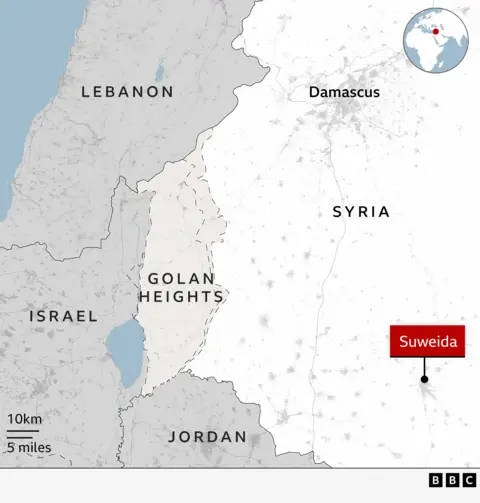 Despite the Syrian government condemning the recent attacks on Druze people and vowing to restore order in southern Syria, its forces have also been accused of attacking the minority - with the UK-based Syrian Observatory for Human Rights (SOHR) war monitor documenting "summary executions" of Druze people by government forces. Such reports have fuelled mistrust among some members of the Druze community towards the authorities in Damascus. After Assad's sudden fall, Israel has been reaching out to the Druze community near its northern border in a bid to forge alliances with Syria's minorities. It has increasingly positioned itself as a regional protector of minorities, including the Kurds, Druze and Alawites in Syria, while attacking military sites in Syria and government forces. During the sectarian clashes in May, [Israel carried out strikes near the presidential palace in Damascus](https://www.bbc.co.uk/news/articles/ckg58kyxxvxo), saying it was a warning against attacks on the Druze. However, some Druze figures in Syria and Lebanon have accused Israel of stoking sectarian divisions to advance its own expansionist aspirations in the region. Why is Israel attacking Syria now? ---------------------------------- The most recent strikes have primarily acted as a warning and a deterrent against the Syrian army deploying to southern Syria, with Israel seeking to create a demilitarised zone in the area. In particular, Israel fears the presence of Islamist fighters near its northern border, along the Israeli-occupied Golan Heights. While the Israeli air strikes on 15 July were limited to targeting security forces and vehicles in Suweida, [the Israeli military expanded the scope of its attacks on 16 July](https://www.bbc.co.uk/news/articles/cp90l77187zo), striking the Ministry of Defence and the Syrian army headquarters in Damascus. Syria has condemned the attacks. The strikes represented the most serious Israeli escalation in Syria since December 2024, when it obliterated hundreds of military sites across the country and [seized a UN-patrolled buffer zone in the Syrian Golan Height](https://www.bbc.co.uk/news/articles/cdx921zreweo)s. Israel has struck Syria multiple times, with the intention of preventing the new authorities from building its military capacities - viewed as a potential threat to Israeli security. "The warnings in Damascus have ended - now painful blows will come," Israeli Foreign Minister Israel Katz wrote on social media on 16 July, shortly after Israeli strikes on Damascus began. The targeting of the Syrian military headquarters was broadcast live by the leading Syria TV channel, from its studios located across from the building - with the presenter captured on air fleeing the studio. Watch: How a day of bombing unfolded in Damascus How has the rest of the world reacted? -------------------------------------- The US Secretary of State Marco Rubio has said the US was "very concerned" about the violence and announced on 16 July: "We have agreed on specific steps that will bring this troubling and horrifying situation to an end tonight." Several Arab states, including Lebanon, Iraq, Qatar, Jordan, Egypt, and Kuwait, have condemned the Israeli strikes targeting Syrian government and security forces. Saudi Arabia's foreign ministry denounced what it described as "Israel's blatant attacks" on Syria, while Iran described the attacks as "all too predictable". Turkey, a key stakeholder in post-Assad Syria, described the strikes as "an act of sabotage against Syria's efforts to secure peace, stability and security". UN Secretary-General Antonio Guterres also condemned Israel's "escalatory" strikes in Suweida and Damascus. What could happen next? ----------------------- The violence has underlined the fragility of Syria's post-war security and political landscape, with the most recent spate of violence fuelling fears of renewed sectarian attacks across Syria. As Sharaa attempts to establish control over Syria and to unite its various groups, it remains to be seen whether his Islamist-dominated government will be able to reconcile Syria's deep-rooted sectarian divisions, stoked by years of civil war. The sectarian clashes, along with the Israeli strikes, threaten to derail attempts at state-building and post-war recovery. Israel, for its part, is likely to continue to perceive the new authorities, and its affiliated Islamist fighters in the south, as a significant security threat - pushing it to pursue alliances with groups that may feel alienated by the new authorities.
2025-07-19
-
Jon Donnison BBC Correspondent•[@jondonnisonbbc](https://twitter.com/jondonnisonbbc) Reporting fromDamascus, Syria Jaroslav Lukiv & Amy Walker BBC News 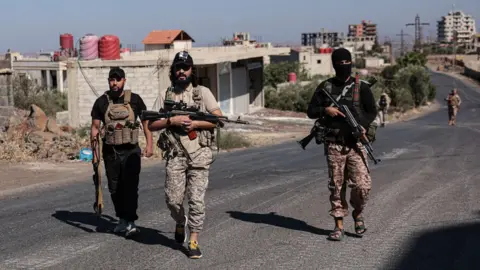EPA Syrian security forces in Suweida The Syrian presidency has announced an "immediate ceasefire" in the southern city of Suweida to try to bring an end to a week of sectarian violence that has left hundreds dead. There have been chaotic gun battles on city streets between the local Bedouin tribesmen and the Druze community, with both accused of atrocities. Graphic footage shows bodies strewn in the streets. "This moment requires unity of ranks and complete cooperation in order to overcome what we are all going through," Syria's interim president Ahmed al-Sharaa said. Whether the ceasefire will be upheld on the ground is unclear, with unverified reports on Saturday suggesting tribal fighters were already violating the agreement. The ceasefire announcement came as Syrian internal security forces were deployed to Suweida to end the clashes - a move approved by Israel as long as the Druze citizens were protected. Suweida's Druze community follows a secretive, unique faith derived from Shia Islam, and distrusts the current government in Damascus. They are a minority in Syria, as well as in neighbouring Israel and Lebanon. Israel intervened in the conflict earlier this week, hitting government forces and [the defence ministry building in Damascus](https://www.bbc.co.uk/news/articles/cp90l77187zo) as it declared support for the Druze. On Saturday, Israel's foreign minister cast doubt on a renewed pledge by Sharaa to protect minorities in Syria. In a social media post, Gideon Saar [said](https://x.com/gidonsaar/status/1946506834937864530) it was "very dangerous" to be part of a minority in Syria, and "this has been proven time and again over the past six months". He added: "The international community has a duty to ensure the security and rights of the minorities in Syria." According to the UK-based Syrian Observatory of Human Rights (SOHR), 718 people have been killed since the violence erupted on Sunday. * [Watch: How a day of bombing unfolded in Damascus](https://www.bbc.co.uk/news/videos/czdve2l18gmo) The clashes initially started between Bedouin fighters and Druze factions, before drawing in government security forces that were sent to the area. US ambassador to Turkey, Tom Barrack, first announced that Syria and Israel had agreed to a ceasefire on Friday. He said the truce was supported by neighbours including Turkey and Jordan, however Israel has yet to comment on the agreement. "We call upon Druze, Bedouins, and Sunnis to put down their weapons and together with other minorities build a new and united Syrian identity in peace and prosperity with its neighbours," Barrack, who is also Washington's Special Envoy for Syria, said. The BBC's Middle East correspondent Lina Sinjab, reporting from Syria, said violence towards the Druze is spreading across the country. Earlier this week, UN human rights chief Volker Türk said his office had received credible reports indicating widespread violations and abuses during clashes, including summary executions and arbitrary killings in Suweida. Among the alleged perpetrators were members of the security forces and individuals affiliated with the interim government, as well as local Druze and Bedouin armed elements, Türk said in a statement. "This bloodshed and the violence must stop," he warned, adding that "those responsible must be held to account". In his comments on Saturday morning, the Syrian leader said that his government "is committed to protecting all minorities and sects in the country and is proceeding to hold all violators accountable from any party. No one will escape accountability."
2025-07-22
-
Donald Trump was “caught off guard” by Israeli strikes on Syria last week, the White House has said, adding that the US president called [Benjamin Netanyahu](https://www.theguardian.com/world/benjamin-netanyahu) to “rectify” the situation. Israel launched [strikes on the capital Damascus](https://www.theguardian.com/world/2025/jul/16/israel-strikes-syria-defence-ministry-in-third-day-of-attacks-on-the-country) and the southern Druze-majority city of Sweida last week, saying it aimed to put pressure on the Syrian government to withdraw its troops from the region [amid ongoing clashes there](https://www.theguardian.com/world/2025/jul/19/escalating-unrest-in-syria-lays-bare-new-regimes-momentous-challenges). Trump “was caught off guard by the bombing in [Syria](https://www.theguardian.com/world/syria) and also the bombing of a Catholic church in Gaza,” spokesperson Karoline Leavitt told reporters at a press briefing on Monday. “In both accounts, the president quickly called the prime minister to rectify those situations,” she continued. An Israeli strike on Gaza’s only Catholic church last week, [killed three people and injured 10 others](https://www.theguardian.com/world/2025/jul/17/israeli-attack-on-church-in-gaza-injures-priest-pope-francis-called-daily) including the parish priest, who used to receive daily calls from the late Pope Francis. The Israeli prime minister called Pope Leo to express regret over the strike on the Gaza church, blaming a “stray missile.” Netanyahu visited the White House earlier this month, his third trip since Trump returned to power in January, and Leavitt praised his relationship with the president, adding they were in “frequent communication.” Israel and Syria on Friday [began a US-brokered ceasefire](https://www.theguardian.com/world/2025/jul/19/syrian-government-declares-comprehensive-ceasefire-in-sweida) and on Monday, Syrian authorities evacuated Bedouin families from Sweida. The Syrian Observatory for Human Rights monitor said the ceasefire was largely holding despite isolated gunfire in areas north of Sweida city, with no new reports of casualties. [Last week’s clashes in the southern province](https://www.theguardian.com/world/2025/jul/18/its-impossible-to-tell-who-is-killing-us-four-days-of-violence-end-with-hundreds-dead-in-southern-syria) killed more than 1,260 people, according to the war monitor, and have shaken the rule of interim President Ahmed al-Sharaa, who has pledged to protect minorities in a country devastated by 14 years of war. In May, Trump [met with Sharaa](https://www.theguardian.com/us-news/2025/may/14/trump-meets-syria-president-after-lifting-us-sanctions) in Saudi Arabia and announced the [lifting of many longstanding US sanctions against Damascus](https://www.theguardian.com/us-news/2025/jun/30/trump-expected-to-sign-executive-order-to-lift-some-sanctions-on-syria). Trump later praised the leader, who led a major armed group that was once aligned with al-Qaida and [toppled the Syrian government of Bashar al-Assad](https://www.theguardian.com/world/2024/dec/14/the-army-just-ran-away-how-bashar-al-assad-lost-his-brutal-grip-on-syria) in December. The United States removed a bounty on Sharaa after he came to power. _With Agence France-Presse_
-
One month ago, while announcing US airstrikes targeting Iran’s nuclear program, President Donald Trump said that he and Israeli Prime Minister Benjamin Netanyahu had worked together as a team “[like perhaps no team has ever worked before](https://abcnews.go.com/Politics/transcript-donald-trump-addresses-nation-after-iran-strikes/story?id=123084288).” This was notable because Trump had just [publicly discouraged Israeli strikes](https://x.com/BarakRavid/status/1933203677273006337) against Iran almost up until the moment that they began, and because — as I wrote in May — in the first few months of his administration, the [US and Israel often did not appear to be on the same page](https://www.vox.com/politics/413077/trump-israel-hamas-houthis-iran) about regional conflict. In May, the administration [cut a deal with Hamas](https://www.npr.org/2025/05/12/g-s1-65868/hamas-release-israeli-american-hostage-edan-alexander) — without Israel’s involvement — to secure the release of an American hostage in Gaza. Then, the US reached a [ceasefire agreement with the Houthis](https://www.vox.com/the-logoff-newsletter-trump/411864/trump-houthis-yemen-ceasefire-red-sea-shipping), in which the Yemeni rebel group pledged to stop attacking American ships but notably made no mention of its ongoing attacks against Israel. And then there was the ongoing effort, in the face of heavy Israeli skepticism, to reach a new nuclear enrichment deal with Iran — an effort that came to an end, at least for now, with the Israeli and American bombing campaign. Understand the world with a daily explainer plus the most compelling stories of the day. Sign up [here](https://www.vox.com/pages/today-explained-newsletter-signup). But if the “12-Day War” with Iran ushered in a new era of US-Israel regional cooperation, it was a short-lived one. In general, the pendulum seems to be swinging back toward Trump and Netanyahu not getting along. Last week, Israel’s bombing of Gaza’s only Catholic church [prompted an angry call](https://www.timesofisrael.com/under-pressure-from-trump-netanyahu-says-he-regrets-mistaken-shelling-of-gaza-church/) from Trump. Ambassador Mike Huckabee, arguably the most staunchly pro-Israel high-ranking Trump official, has been uncharacteristically critical after the [killing of a US citizen](https://www.politico.com/news/2025/07/15/huckabee-palestinian-american-west-bank-00454777) and an [attack on a different Palestinian church](https://www.reuters.com/world/middle-east/us-says-attack-west-bank-palestinian-church-was-act-terror-2025-07-19/) in the West Bank, both allegedly by Israeli settlers. And now, the Trump and Netanyahu administrations are also plainly at odds over Israel’s latest intervention in Syria. Israel has been periodically launching airstrikes in Syria for years, but the latest clash began last week when Syria’s government sent troops into its southern Sweida province to put down clashes between Bedouin tribes and armed groups from the local Druze community, a religious minority group. The troops were accused of carrying out summary executions against the Druze and attacking civilians. This [prompted Israel to launch strikes](https://apnews.com/article/syria-clashes-druze-israel-92a72655b85fba1d0b12cc36ffe2cef3) against the Syrian forces and against the defense ministry in Damascus. Israel wants to keep Syrian forces out of areas close to its borders; it also has an interest in protecting the Druze, who have a substantial community in Israel and are heavily represented in its armed forces. This is all very awkward for the Trump administration. At the urging of allies in the Gulf, the US has gone all in on normalizing relations with Syria’s new government, including the once-unthinkable meeting between Trump and President Ahmad al-Sharaa, a former rebel leader who was once a member of al-Qaeda, in May. Trump has expressed hopes for diplomatic normalization between Syria and Israel, though the Israelis have been less enthusiastic. Netanyahu urged Trump not to lift sanctions on the Syrian government. The tensions between the two positions are now on full display. [Reuters reported that the Syrian government](https://www.reuters.com/world/middle-east/syria-believed-it-had-green-light-us-israel-deploy-troops-sweida-2025-07-19/) had sent its troops into Sweida believing that it had a green light from the US, which has urged the new leaders to take full security control of the fractured and war-torn country. Tom Barrack, the US ambassador to Turkey who is also special envoy to Syria, [criticized the Israeli strikes](https://apnews.com/article/syria-us-barrack-israel-druze-ede9f5299c4e59a477736842adcd7de9) as “poorly timed,” and said there was no alternative to working with Syria’s current government. Speaking on background, administration officials are even more peeved, with one telling Axios, “[Bibi acted like a madman](https://www.axios.com/2025/07/20/israel-syria-strikes-trump-netanyahu-divide). He bombs everything all the time. … This could undermine what Trump is trying to do.” “Bombing everything all the time” isn’t far off. Since the Iran strikes ended, Israel has carried out military operations in Lebanon and Yemen and made clear it reserves the right to hit Iran again. As I [recently noted](https://www.vox.com/politics/419650/israel-mowing-grass-iran-hezbollah-yemen), this is a kind of region-wide version of the “mowing the grass” strategy Israel employed in Gaza before the October 7, 2023, attacks: periodically striking its adversaries to degrade them and keep them off balance while avoiding long, costly engagements. To put it lightly, the strikes against Iran did not create a peaceful new regional order, as [Trump said they would](https://www.cnn.com/2025/07/07/politics/trump-netanyahu-middle-east-hamas-peace-israel-visit). Instead, they have been followed by what looks like long-term, low-intensity warfare between Israel and its enemies throughout the region. That, combined with the ongoing bloodshed in Gaza and fading prospects for a new ceasefire there, seems very likely to provoke tension between Israel and a US administration that has vowed to draw down its military presence in the Middle East — but [seems continually drawn into the region’s conflicts](https://www.vox.com/world-politics/417710/mideast-wars-trump-iran).